TRUSTEES’ REPORT AND FINANCIAL STATEMENTS FOR THE YEAR ENDING 2023

The Society for Experimental Biology is a company, no. 01314879, and charity, no. 273795, registered in England and Wales.
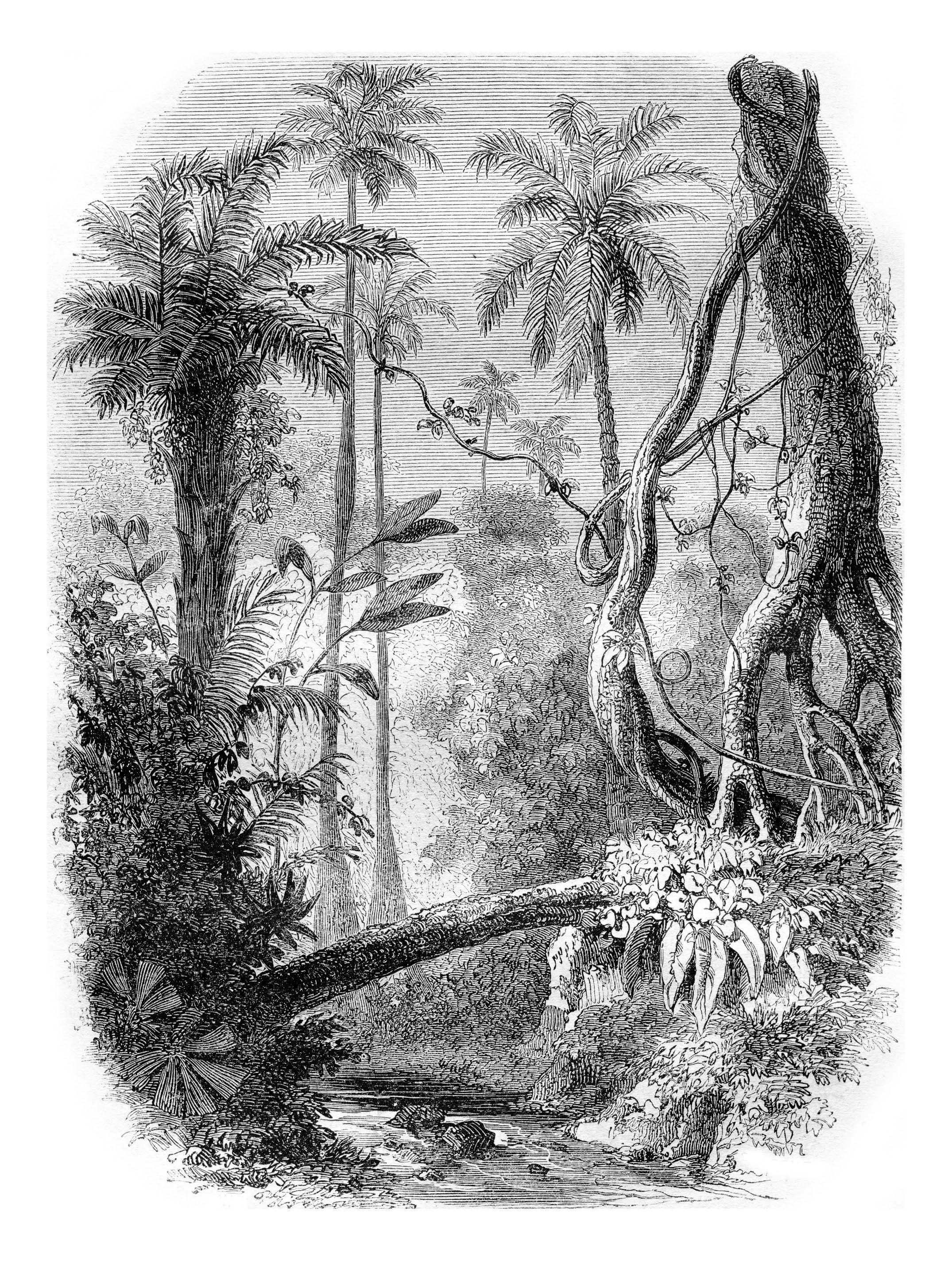
SOCIETY

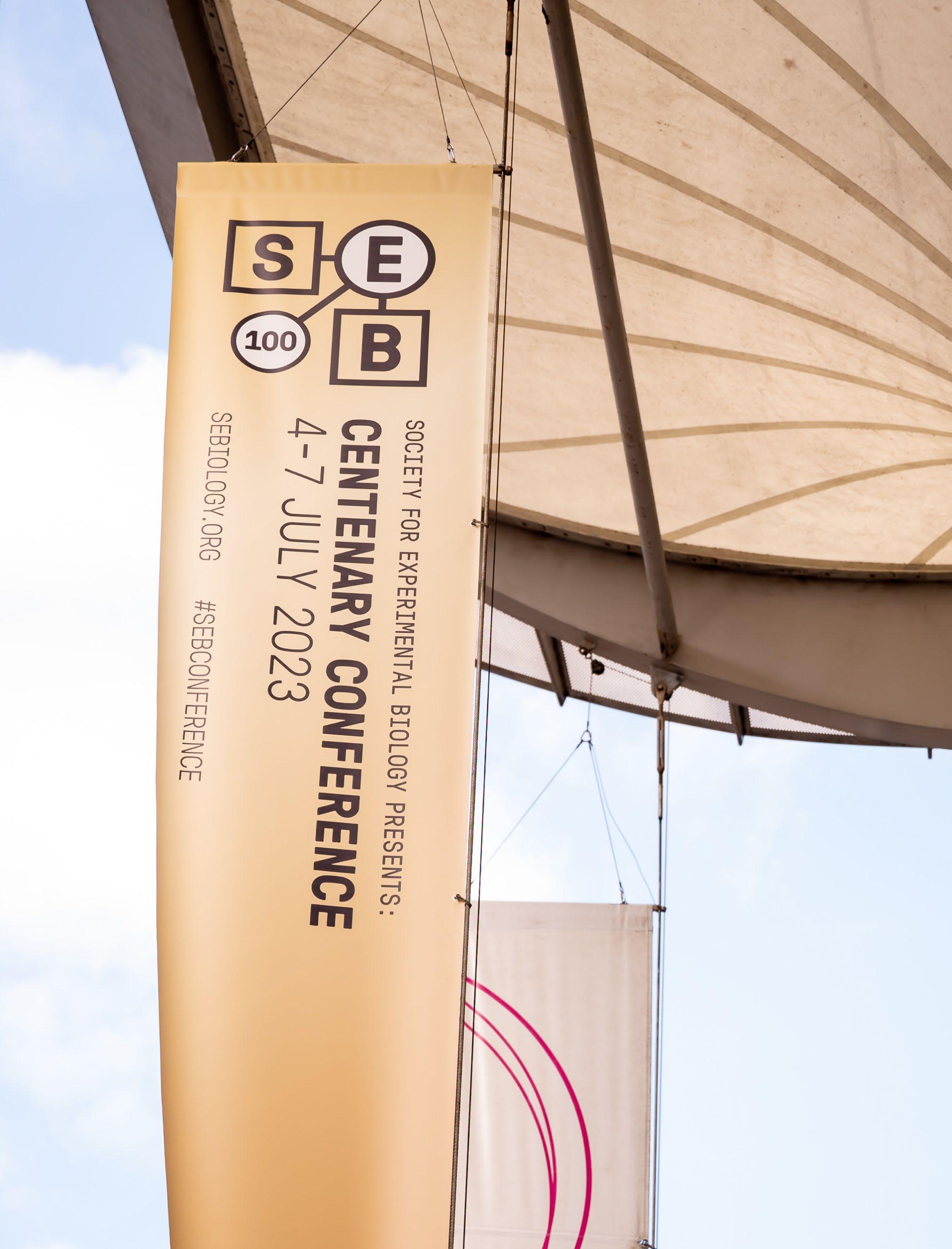

TRUSTEES’ REPORT AND FINANCIAL STATEMENTS FOR THE YEAR ENDING 2023

The Society for Experimental Biology is a company, no. 01314879, and charity, no. 273795, registered in England and Wales.

SOCIETY


The stated objective in the Articles of Association for the Society for Experimental Biology (SEB) is to promote the art and science of experimental biology in all its branches.
The Strategic Review 2020 – 2025 1 set out the Society’s principal objectives for that period;
• To encourage and support the practice of, and scientific careers in experimental biology in research and development programmes in universities, institutes, government bodies and the private sector throughout the world.
• To help the public understand the value that experimental biology brings to their lives and how to use information derived from experimental biology to make informed decisions.
• To develop and maintain thriving partnerships with other learned societies that have common objectives
1 https://www.sebiology.org/who-weare/structure-and-governance/strategy.html

and to encourage support for experimental biology from decision makers and funding organisations.
• To set the highest ethical standards in all the Society's activities in order that it is seen as an open and transparent organisation that holds the improvement of the lives of people and the environment as core values.
• To maintain robust financial performance and governance structures that support the above aims.
The Directors/Board of Trustees (Council) review the objectives periodically. In 2023 the charitable objectives were, as set out below.
The Society aims to promote, and increase the influence of Experimental Biology within the scientific community and Society by:
• developing the field of, and scientific careers in, experimental biology;
• developing education and public awareness in experimental biology;
• developing collaborative partnerships;
• maintaining transparency, ethical and environmental sensitivity in every sphere of activity;
• ensuring the financial viability of the Society.
In pursuit of its aims SEB’s activities include:
• the organisation and sponsorship of experimental biology conferences, both independently and in collaboration with other life science societies;
• the publication and dissemination of a range of scientific literature;
• education, outreach and careers engagement (often in collaboration with other life science societies);
• the administration of travel grants for young researchers;
• offering membership to experimental biology researchers in academia working at post-graduate level and above.
The activities that provide direct public benefit include:
• Publishing publicly available journals and scientific texts
• Organising scientific conferences and courses that are open to all
• Providing educational materials for outreach
• Participating in sessions at public science festivals
• Developing the subject of experimental biology
• Developing opportunities for young scientists and careers in the field.
The Society sought to continue to deliver across all the pillars of the Strategy; specific objectives for 2023 included:
•Delivering a range of successful SEB sponsored and supported events, including:
The annual conference in Edinburgh, 2nd- 5th July 2023, was a key celebration of the centenary of the Society.
Regular virtual webinars for the SEB journals
Monthly “Career and Coffee” webinar series.
Sponsorship of the Plant Environmental Physiology Group (PEPG) symposia in Portugal from 10th to 15th September 2023.
A plethora of Outreach and Education activities for members and the public.
• Delivering a further range of activity to celebrate the centenary of the Society, including:
Introducing Centenary Branding and a new logo for centenary celebrations.
The Centenary year provided an opportunity to further promote and allocate more

funding towards existing grants.
Additionally, awarding further grants to members (e.g. SEB Birthday grants)
Introducing a member peer Mentoring Scheme
Impact Lectures to address how Experimental Biology research from the past 100 years has contributed to solving current problems and how research from today will impact the next 100 years.
Leaders of the Future Webinars
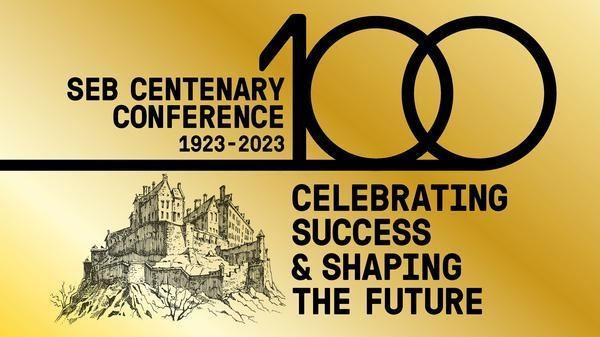

• Continue to deliver high quality peer reviewed journals, including:
Planning for the launch of a new Cell biology Journal
Agreeing a new contract for Conservation Physiology.
Promoting the links between the journals and the Society in support of centenary celebrations
• Improve Member engagement:
the focus is member retention and improving the current membership offering.
• Maintain the provision of Grants, actively promoting existing grants and introducing new grants for the centenary:
• Further expansion of the Outreach, Education and Diversity (OED) portfolio
the centenary year provided a significant opportunity to continue building on our progress in these areas and increase our efforts to promote the wider impact of experimental biology.
• Improved governance, including:
Appointing two new Trustees; a Vice President from the Animal Biology community and an
Early career Scientist/Researcher or teacher.
Delivering enhanced Trustee induction training and unconscious biased training to all Trustees and staff.
Reviewing the board structure and Articles of Association
• Continue to make improvements to the Customer Relationship Management system.
The criteria for measuring success in these objectives were:
• Numerical data in relation to publications (e.g., impact factors, download numbers etc.).
• Numbers of early career scientists participating at events.

• Attendance numbers at events organised by the Society and analysis of the feedback from those attending Society events.
• Numbers and type of grants awarded.
• Engagement levels of membership surveys.
• Feedback from members and nonmembers attending OED and/or career support events.
• Communication statistics; aiming for higher levels of engagement from members and the public.
• The achievements that helped the Society meet its annual objectives are set out in the “Achievements” section below.
The trustees confirm that they have complied with the duty in Section 17 of the Charities Act 2011 to have due regard to the Charity Commission's general guidance on public benefit, "Charities and Public Benefit". The Society has referred to this guidance when reviewing its aims and objectives and planning future activities.
In 2023, our Outreach, Education, and Diversity (OED) efforts were integrated with our Centenary Celebrations. Alongside our regular offerings such as grants, workshops, and resources, we introduced Centenary-themed activities and initiatives, many of which were freely accessible to both members and nonmembers. This inclusivity was aimed to boost engagement, widen the reach of the Society, and give back to the wider community of biologists and the public.

In 2023, as in recent years, we supported our members by providing a range of career development opportunities for science professionals and researchers. Our programme included three interactive workshops, two online seminar series for the centenary celebration, and the introduction of a new mentoring scheme.
Poster design and presentation skills
The Poster Design and Presentation Workshop was led by Susan Whitby. During these sessions, members were guided through the process of designing their conference posters and refining their presentation skills, with a focus on engaging audiences
effectively. The event was repeated for the third consecutive year as it has proved to be our most popular in the career workshop calendar. As such, we will continue hosting this workshop in future years. Feedback from the 87 participants was overwhelmingly positive, with detailed comments highlighting the value of the experience.
The Grant Writing Workshop drew an impressive turnout, with 37 registrations representing a diverse
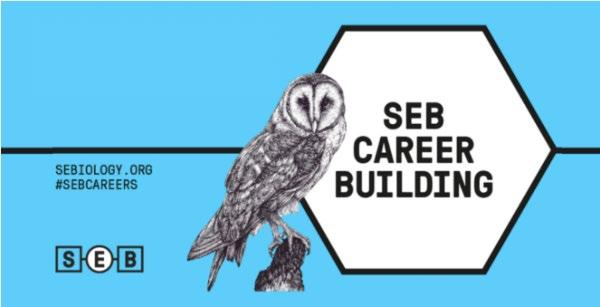



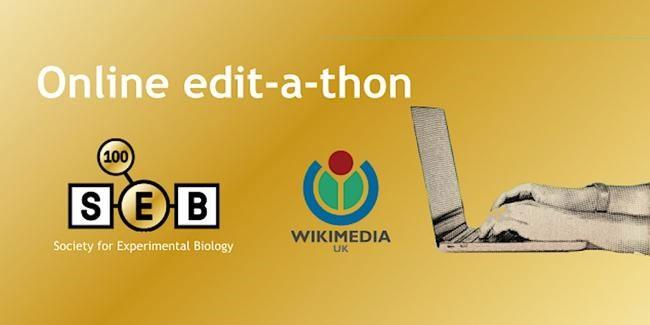


cohort hailing from 20 different countries. Though many attendees were early career researchers, the workshop had a broad appeal to
individuals at various stages of their careers, from PhD students to established researchers.
SEB collaborated with experienced Wikipedia editors and Wikimedia UK to host a two-day interactive course on May 31st and June 1st. Open to both members and non-members, the course required no prior Wikipedia knowledge. Objectives included enhancing visibility and inclusivity by improving pages of biologists from historically marginalised communities, increasing content on experimental biology topics lacking representation, and facilitating translation of existing pages into different languages to foster accessibility. Despite a strong registration of 57 people average attendance per session was lower than anticipated. However, feedback from attendees reflected positive ratings for usefulness (4.2 out of 5) and enjoyment (4.3 out of 5) and tracking Wikipedia changes during the event showcased significant contributions.
For full details on the contributions made, you can check the event dashboard here)
The Careers and Coffee webinars emerged as a continuation of a successful talk series at the Annual Conference in 2021. These free online

sessions offered a 30-minute presentation by an invited speaker, providing insights into their personal career journey, role overview, career prospects, and avenues for entry into the field. This was followed by a question-and-answer session with the audience. The objective was to offer students, early-career researchers, and those contemplating a career shift a glimpse into the diverse job opportunities available to individuals with a biology PhD or Postdoc experience. Registrations for these sessions ranged from 28 to 108 per online seminar with recordings also made available on the members' only area of the SEB website.
Spread throughout the year, these six events aimed to bring attention to a segment of researchers often overlooked in academia: mid-career professionals who receive fewer accolades compared to early career or lifetime achievement awardees. This series highlighted midcareer researchers demonstrating exceptional promise in their fields, including past SEB award winners. The webinars garnered significant engagement, with registrations reaching up to 50 people per session and amassed over 200 views on YouTube following the live event, indicating sustained interest post-event, and extending the reach beyond live participation.

In 2023 we introduced a new mentoring scheme to foster career growth among its members through shared experiences and mutual support. This pilot scheme, aimed to test its viability and success with the potential for further expansion in subsequent years. The program included online training sessions, mentoring guidelines, midterm surveys, and a virtual training session to ensure continual support for participants throughout the year. A total of 41 participants engaged in the scheme, resulting in 33 partnerships due to some individuals taking on multiple roles or mentees. These participants represented a varied spectrum of membership categories, including 12 students (PhD), 18 earlycareer members (within 6 years postgraduation), and 11 full members (beyond 6 years post-graduation).
Engaging members from 20 different countries displayed the global reach of the initiative. These countries were: Germany, Nigeria, UK, Portugal, Spain, Sweden, Ireland, Australia, Norway, Japan, Taiwan, Czech Republic (from spring 2023, Finland), India, Belgium, Czechia, México, United States, France, Canada, Spain (Canary Islands).
Feedback from 15 respondents in the final survey indicated an overall positive response but highlighted the need for more sustained support throughout the year and specific guidance or topic suggestions for mentor-mentee discussions.


Linking 41 biologists
across 3 career stages 33 partnerships created Engaging members from 20 countries




In 2023, we organised two in-person public engagement events: one in collaboration with the Royal Botanic Garden Edinburgh (RBGE) on July 3rd preceding our SEB Centenary Conference, and the other at Southwell Minster on July 28th as part of their family fun day centred on planet Earth.
The RBGE event, comprising drop-in sessions and take-home activities at the Royal Botanic Gardens, Edinburgh, garnered positive feedback. The materials developed for this occasion received acclaim from the venue's outreach staff, underscoring the success of the initiatives. The scavenger hunt, accessed 86 times online and distributed in paper copies, saw active participation. The craft activity, involving making plant pots, was met with enthusiasm by children,
as evidenced by 100% expressing happiness and enjoyment through emotion sticker faces and messages. Additionally, the event provided a valuable engagement opportunity for SEB members, with four volunteers actively participating in delivering the activities.
The second public engagement event, held at Southwell Minster on 28th July, was themed around Planet Earth. Activities included crafting personalised plant pots while discussing plant biology research. Tailored for families, these events aimed to facilitate interactions between researchers and visitors, highlighting the significance of experimental plant biology research in addressing critical global challenges such as food security, biodiversity preservation, and climate change. Qualitative feedback on the day was overwhelmingly positive.

Moreover, these events led to the introduction of our "ask a scientist" page on the website, allowing the public to interact with our members and pose questions about science and research. To date, 33 interactions have been made by the public via this platform.
Since 2021 SEB members have been invited to join a focus group centred around Outreach, Education, and Diversity (OED). The group's mission is to generate new ideas for OED events and activities, to increase member engagement and foster a sense of community (particularly among educators within our membership), and to represent a broader spectrum of perspectives on OED issues affecting our members and the wider experimental biology community. Throughout 2023, we convened online meetings every two months, garnering interest from over 39 members, a number that continues to climb, thanks to the efforts of our OED Trustee, Sheila Amici-Dargan, in promoting the group. The level of engagement among members has been exceptional, with several individuals assuming leadership roles for various initiatives and activities.

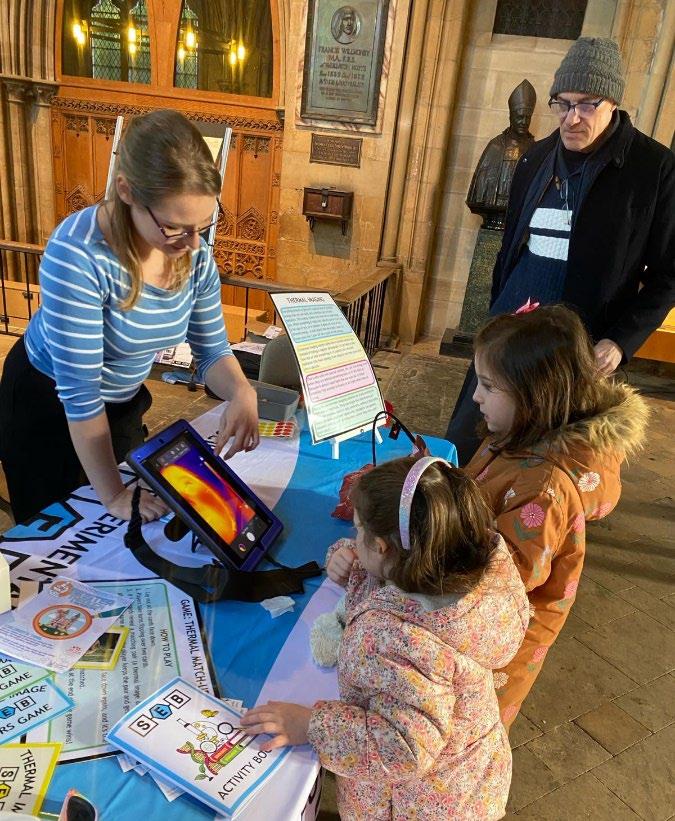

For instance, the SEB Annual Conference programme underwent a notable transformation this year, thanks to heightened member engagement facilitated by the working group. Previously limited to one or two OED-themed session at our annual conference, in 2023 we saw and
expansion to encompass seven sessions covering topics such as teaching and student participation, outreach and public engagement, industry connections, and fostering diversity and inclusion within the bioscience community.
Three members of the working group collaborated closely with the OED manager and outreach officer to establish an online repository for lecturers to exchange laboratory practicals. This platform now enables educators to submit, search for, and download existing worksheets, as well as provide feedback through comments and ratings.
In the realm of diversity, OED working group member Shane Austin played a pivotal role in establishing an awards nomination task force. The primary objective of this task force is to proactively identify deserving individuals within the experimental biology community who may have been overlooked, and to advocate for their recognition in various bioscience awards, starting with the SEB awards in 2023. Throughout the year, the task force held several meetings involving 15 members representing SEB staff, Council members, and interested stakeholders. Their collaborative efforts resulted in the submission of six out of the seven annual lecture nominations. Moreover, the task force forwarded three out of the 13 applications for the Presidents' medals, significantly enhancing the diversity of nominees in this category. Ultimately, half of the final winners of the 2024 SEB awards were nominated
by the task force, underscoring the significant impact of their contributions.
Throughout 2023, SEB did not establish any new long-term strategic partnerships. However, we continued to engage with existing partners to expand the Society's reach and enhance member benefits and engaged in several one-off partnership events aligned with our centenary celebrations.
In July, as part of the centenary conference's additional activities, we partnered with Invisible Cities, a local social enterprise in Edinburgh that provides jobs, training, and support to formerly homeless individuals by offering guided tours of the city. We commissioned a scientific Walking Tour, which highlighted places of scientific interest in Edinburgh. The tours attracted 89 registrants across two sessions, and attendees provided positive feedback, indicating the success of the initiative.
Furthermore, we collaborated with the Royal Society of Edinburgh (RSE) to host a joint evening event at the annual conference. This event featured lectures and a networking drinks reception. Although all 140 available tickets were sold out, the final attendance rate was lower than

anticipated (less than 50%). Nevertheless, the event received excellent feedback and showcased local researchers from Edinburgh, highlighting the past 100 years of various experimental biology disciplines and the significant impact of their work. This joint event with the RSE proved to be impactful, initiating discussions for a similar collaborative evening event with the Czech Academy of Sciences in 2024.
We also looked to widen the reach and impact of our conference in 2023 by engaging the services of a press officer. The officer's role involved identifying conference content with broad appeal, crafting press releases, and facilitating researcher interviews with the media. As a result, SEB featured significantly in research-focused press appearances across various outlets. The 9 press releases created gained substantial media traction, prompting interviews with researchers, and yielding multiple articles based on the press releases. The press releases were viewed 10,000 times in total and resulted in over 400 media features across 35 countries, from regions including the UK, USA, India, central Europe, Australia, and South America. This also led to over 250 mentions of SEB, expanding the Society's visibility.
The centenary marked a pivotal moment in our history and provided an opportunity to reflect on past achievements, celebrate present successes, and lay the groundwork for
future innovation. Projects to honour significant achievements of SEB and our members over the past century included:
Website and branding
We embraced our Centenary celebrations with an adaptation of the branding, integrating a gold colour scheme and an updated logo. This revamped branding was used across 2023, encompassing all Centenary initiatives and events, and was made readily available for download via the SEB website. The adopted branding elements created continuity and celebratory atmosphere across events.
Birthday card
The virtual birthday card initiative launched on our website during the centenary year gave an opportunity for members, supporters, and stakeholders to share their memories and experiences with us. We encouraged individuals to share personal anecdotes about their initial encounters with the SEB, pivotal moments at our events, or instances of professional growth and recognition within the Society. We also offered a physical centenary guest book at events for attendees to sign with similar messages. Across the year, the virtual card received 32 submissions that recounted stories, ranging from forging both personal and professional relationships, publishing for the first time in SEB journals, and receiving awards at SEB conferences. These narratives demonstrate SEB’s impact

on professional and personal growth. Among the submissions, four included attachments of a program book from 1973, conference photographs, and an article published in a science education magazine about positive experience of one attendee at an SEB conference.
Throughout the year, we wrote or commissioned a series of articles for the website that explored various aspects of the Society's history. They covered diverse themes from the Society's origins and evolution to pivotal contributions. Additionally, a video detailing the origins of the Society and the Journal of Experimental Biology, was produced for social media. This resource means we now have a written record of all past presidents, a comprehensive list of inaugural members and initial Council members, and a better understanding of traditions within the Society, such as naming of SEB awards. Efforts are still ongoing, for example, compiling a complete list of events and conferences, as some data from the 1980s is still missing.

The culminating event of the SEB's 100-year celebrations was the Centenary Dinner held in November 2023 at Bush House, a historically significant location for the Society, marked by being the site of the first known SEB photograph which was recreated during the dinner has and earmarked for inclusion in the Society's archives.



Guests included former SEB presidents, current staff, trustees, and representatives from partner organisations. Additionally, SEB members were offered the chance to participate in a competition for complimentary tickets to the dinner. A "Celebrating 100 Years of SEB" presentation book, serving as a

written record of the Society's achievements throughout the last century, and SEB champagne coupe were gifted to all guests in memory of the occasion.


Group (PEPG) symposia in September 2023.
The 2023 Centenary Conference was held at the Edinburgh International Conference Centre (EICC) from July 4th to 7th, drawing 1050 attendees to commemorate 100 years of the Society of Experimental Biology.



In 2023, our events department focused on the successful delivery of the culmination of our centenary celebrations: the SEB's 100th Annual Conference in Edinburgh, United Kingdom. This centenary conference marked the second fully hybrid conference organised by the society, offering delegates the opportunity to attend all sessions and talks either in person or virtually, thus ensuring that our events remain accessible to the wider community. Additionally, the SEB supported the delivery of the Plant Environmental Physiology

The program featured up to 16 parallel sessions running concurrently, showcasing an impressive and diverse array of scientific content for all sectors of the SEB community. A notable addition was the special "100 years of SEB" session, which honoured key science and scientists in experimental biology. This session invited speakers to connect their current research programs to the historical legacy of their respective research topics.
The centenary conference incorporated several social events, providing networking opportunities for attendees at all career stages and an opportunity to explore the host city of Edinburgh. The social events included:
• The Awards Dinner, hosted at Dynamic Earth underneath their impressive globe, provided attendees with a three-course dinner while various SEB awards were presented by the President.
• The Meet Your Convenor session offered attendees an opportunity
to connect with special interest group convenors over lunch.
• The Royal Society of Edinburgh (RSE) Evening was a joint event hosted with the SEB, featuring short talks from renowned scientists, followed by a drink’s reception and networking opportunity for 140 attendees.
• The Scientific Walking Tour of Edinburgh, hosted by Invisible Cities, was specially curated to allow delegates to discover the city’s scientific past.
• The Botanic Garden Outreach event took place on Monday 3rd July, preceding the SEB centenary conference. This event was partnered with the Royal Botanic Gardens Edinburgh to encourage families visiting the gardens to interact with researchers and learn about the importance of experimental plant biology in addressing current real-world issues.
Delegate analysis
Conference attendance exceeded that of recent events, including the entirely virtual annual conference in 2021:
• SEB Virtual Annual Conference 2021 – 930 attendees
• SEB Annual Conference Montpelier 2022 – 534 attendees
• SEB Centenary Conference Edinburgh 2023 – 1050 attendees
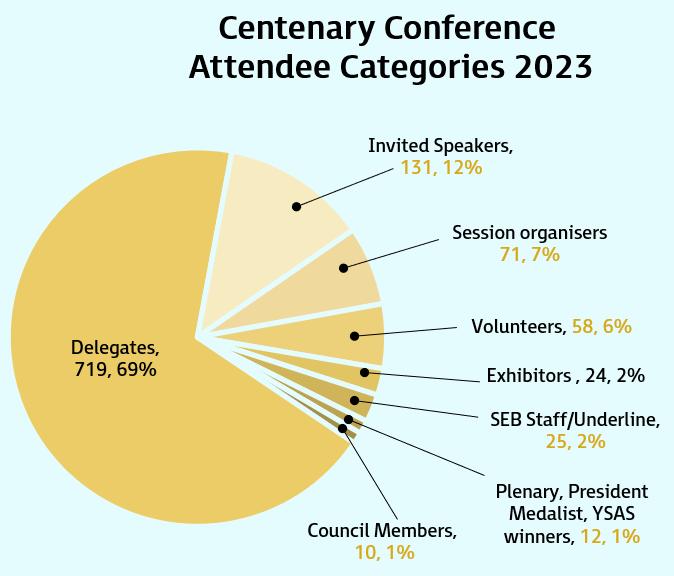
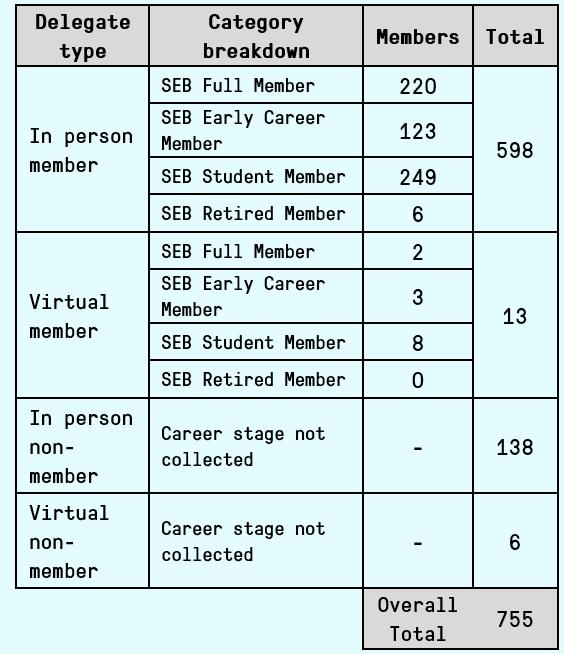
attendees by global region.


Fig. 11: Table showing a breakdown of delegate categories*.

*Please note this table includes Council members (10), SEB/Underline Staff (19), Presidents’ medallists/plenaries/YSAS winners (12) across various categories
Overall, we had attendees from 44 countries spanning every region of the world (see Fig. 11). The United Kingdom held the largest proportion of attendees (33%), closely followed by Europe at 30%. The 75 attendees with undisclosed information were predominantly SEB & Underline Staff or Exhibitors. SEB member registration emerged as the most popular option for the conference. The table below (Fig. 10) shows a detailed breakdown of SEB delegate registration categories, including non-member, member, in-person registration, and virtual registration. Please note that this table excludes invited speakers, session organisers, exhibitors, volunteers, and journal staff.

Anecdotal feedback gathered on-site at the conference emphasised the centenary event as a success, reflecting the positive and vibrant atmosphere experienced during the event. Following the conference, a post-event survey was distributed to capture additional details. In total, we received 55 responses on the postevent survey, representing just over 5% of the total attendees. As no identifying details were collected, all responses from delegates remained anonymous.
“VENUE WORKED REALLY WELLFANTASTIC NUMBER OF HELPFUL CONFERENCE CENTRE STAFF EVERYWHERE YOU LOOKED.”
Feedback from the post-conference survey, Edinburgh 2023.
The tables below present key feedback elements. Overall, the survey indicated that most responses found the event enjoyable or highly enjoyable. Specific conference elements were rated to highlight key successes and areas for improvement next year. Additionally, it was discovered through the survey that there was low awareness of our heavily subsidised on-site Creche, which will be promoted more extensively in 2024.
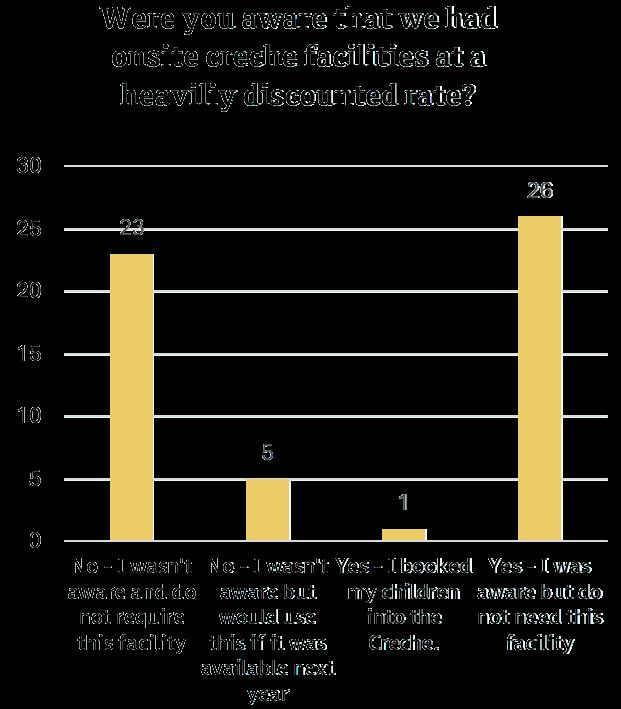
Fig.12: Graph showing delegate awareness for on-site Creche facilities to assist with conference accessibility.

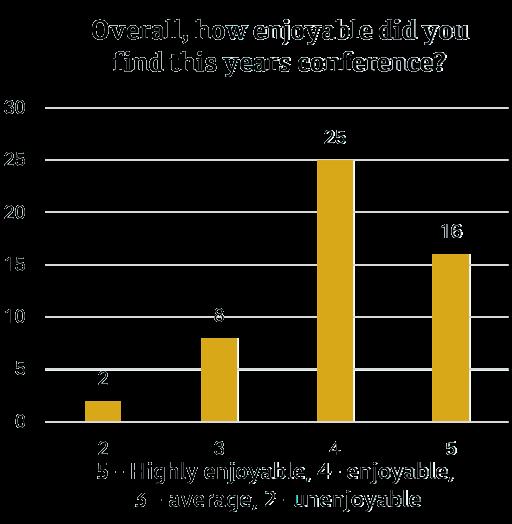
Fig. 13: Graph showing how much delegates enjoyed the Annual Conference, Edinburgh 2023.

“EXCELLENT SESSIONS AND SPEAKERS, GREAT COMMUNITY SPIRIT AND SUPPORT”
Feedback from the post-conference survey, Edinburgh 2023.
“GREAT TALKS AND ENJOYED THE OPPORTUNITY TO MEET COLLEAGUES WHOM I RARELY, IF EVER, HAVE A CHANCE TO MEET IN PERSON.”
Feedback from the post-conference survey, Edinburgh 2023.
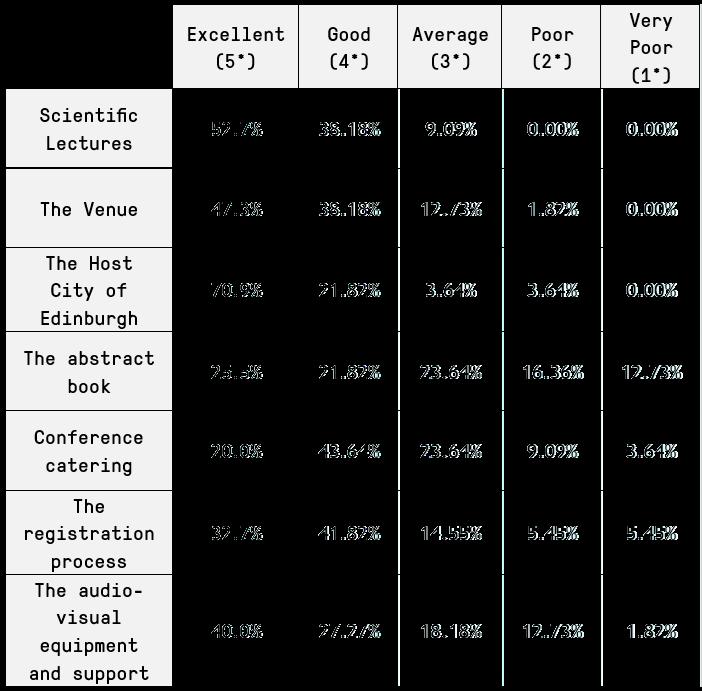
Fig. 14: Delegate ratings on different elements of the conference.

Based on survey and staff feedback, please see below a condensed list of key areas which have been highlighted for improvement alongside our initial plans for Prague 2024.
• Poster session schedule:
Originally spanning two days, the poster sessions were condensed to accommodate our keynote speaker, Sir Paul Nurse. For Prague 2024, SEB will revert to one of the original formats, with odd or even numbered abstracts presenting on different days or times.
• Increased opportunities for Early Career researchers (ECR) networking: For Prague 2024, a proposed ECR social event is scheduled to take place providing ECRs across all sections with the chance to socialise.
• Online programme and abstract book: Improvements to the scheduling display and filtering options have been implemented. Adjustments to event deadlines have been made to ensure the abstract book will be available before the conference.
• Awards dinner entertainment: Entertainment has been incorporated into the awards dinner schedule and discussed with the venue during the initial planning stages.
• New exhibitor and sponsorship packages: Sponsorship and exhibitor packages have been introduced focusing on tiered packages (Gold, Silver, Bronze)
offering various benefits. Specific elements such as the Creche will be available for individual sponsorship.
• First aid training for staff: While a paramedic was present on-site for the duration of the conference, it was determined that for Prague 2024, as we are not considered a high-risk event, multiple SEB staff will undergo the St. John’s Ambulance Emergency First Aid Course in 2023 to meet duty of care requirements.
The SEB Plant Environmental Physiology Group (PEPG)’s Field Techniques Workshop took place at Naturasolta - Quinta de São Pedro, Portugal, from the 11th to the 15th of September 2023. The workshop brought together 95 individuals from various career levels across the Plant Biology Section to showcase their work and to meet and connect with other plant biologists in a unique
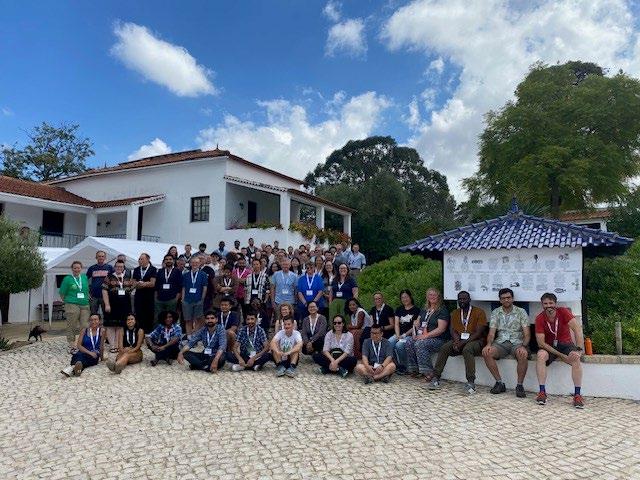

setting and laid-back atmosphere in picturesque southern Portugal.
The SEB assisted with the organisation of the event, including
“HAVING THE SEB THERE MADE ME APPRECIATE EVERYTHING THE SOCIETY OFFERS US AS MEMBERS!”
Feedback from the PEPG Workshop, Portugal 2023.
registration management and the provision of two staff attendees onsite. Our Outreach, Education, and Diversity Manager, Rebecca Ellerington, and our Events Officer, Jenifer Symons, both attended to manage the event on-site.
In total, there were 95 attendees at the conference, including invited speakers, exhibitors, and staff. This figure encompasses 65 delegates who registered and paid to attend the event. Students (46%) and Early Career individuals (27%) comprised the majority of attendees. Over 70% of attendees found the event extremely useful, closely followed by 27% finding it useful. This echoes the extremely positive feedback provided.
“SUPER INSIGHTFUL AND WELLORGANISED EVENT! IT WAS DELIGHTFUL TO BE PART OF IT.”
Feedback from the PEPG Workshop, Portugal 2023.
For 73% of individuals, this was their first SEB event, setting a positive tone for future engagement with the society and
highlighting the importance of providing these workshops.
The Society offers two main travel grants, the Company of Biologists Travel Grant and the SEB Travel Grant, alongside additional funding including our outreach, diversity, and hardship grants. In honour of our centenary, we boosted the SEB Travel Grant to facilitate greater access to our annual conference and introduced a top-up fund to aid those facing significant financial barriers. Additionally, a special Birthday Grant was introduced for our centenary year, enabling members to host celebratory events and enhance networking opportunities. This, coupled with increased funding, amounted to a total offering of £100,000 for our 100th year, the details of which are set out below.
In 2023, the Company of Biologists awarded the Society a total of £17,096. £22,904 was unspent at application date and thus carried forward to 2023 leaving £40,000 (an increase on prior year of £2,500) to distribute. The Company of Biologists travel grant supports SEB student and early career members in attending conferences, workshops, research trips, and laboratory visits. Eligible members may also apply for funding to support registration for virtual or online events and training courses.

The funding enabled us to support 44 students and early career researchers, spending a total of £19,550 of the grant available. Reports from travel recipients are published on the SEB’s news page on our website as well as biannually in the SEB member magazine.
In addition to the Company of Biologists grant, the Society also provides £20,000 annually to support students attending and presenting at our Annual Conference. For our centenary year, we raised this funding to £40,000, doubling the usual travel grant and establishing a Centenary top-up fund to assist those facing significant financial barriers to attending in person. We also revised the grant criteria to offer financial assistance proportional to the distance travelled. This approach allowed for a more equitable distribution of resources, enabling us to assist a greater number of individuals.
The amount of funding that each person could apply for was increased to provide a maximum of £300 for UK delegates (£150 in 2022), £600 for applicants from European countries (£300 in 2022) and £800 for those outside Europe (£500 in 2022).
Council is currently evaluating the impact of these revised criteria on enhancing conference accessibility and fostering more equitable support. Depending on the findings, we will explore the possibility of permanently adjusting the grant terms.
The total funding distributed was £42,139, supporting 64 applicants.
The SEB initiated a top-up fund to aid those who received the SEB travel grant to attend our Centenary Conference but faced expenses significantly surpassing the grant's monetary value. Applicants eligible for the top-up fund incurred travel costs exceed twice the grant amount. The assessment of top-up fund applications was individualised, focusing on prioritising attendees with reduced income, from low-income countries, or lacking access to other funding.
SEB aimed to provide a maximum of 30% additional funding to bridge the gap between the original grant and the actual travel costs, capped at £240. In total we received 34 applications, of which 22 were approved (65%). Rejections primarily occurred due to applicants not receiving the SEB travel grant or not meeting the criteria. The total support amounted to £2,630.
The SEB Outreach and Engagement Grant serves as a vital resource for supporting events and activities aimed at enhancing public understanding of science and fostering engagement with various aspects of experimental biology. In 2023, the grant, now in its second full year, saw a significant increase in interest, receiving 48 applications more than double the previous year's submissions. However,

despite the surge in applications, only seven projects were approved. This was largely due to a high rate of applications focused on conference travel or research projects, rather than outreach or public engagement endeavours. Consequently, many applicants were redirected to other funding opportunities such as the SEB Travel Grant or the Company of Biologists Travel Grant.
Nonetheless, the seven approved projects represent a diverse range of impactful initiatives, and spanned across the UK, Nigeria, India, and Italy, highlighting the global impact of the initiative. Details on the successful applications can be found below:
Ms Spatika Jayaram University of Cambridge, UK
In collaboration with the India Science Festival (ISF), Ms. Spatika Jayaram expanded the accessibility of experimental neuroscience research across India through two outreach initiatives: Talk Your Thesis (TYT) and an exhibit titled “‘Behaving Yourself ” which focused on neuroethology. These initiatives, targeting diverse audiences including high school and college students, sought to bridge the gap in neuroscience education and promote scientific engagement, particularly among underrepresented groups such as women. Leveraging international experiences and collaborating with local institutions, Ms. Jayaram fostered a culture of scientific inquiry and collaboration
while highlighting advancements in neuroscience within the country.
Dr David Audu Federal University of Agriculture, Abeokuta Nigeria
Dr David Audu initiated a project in rural Nigeria to introduce experimental biology to final-year science students. Through interactive sessions and inspiring stories of earlycareer researchers, the initiative aimed to spark students' interest and dispel misconceptions about the field. By fostering lasting connections with schools and documenting the outreach's impact, the project seeks to establish experimental biology as an accessible and compelling career path for secondary school students.
Mr Vikas Garhwal Indian Institute of Science Education and Research Kolkata, India
Mr. Vikas Garhwal's project explored the role of phytohormones and environmental cues in seed germination, a critical process in plant development. By focusing on hormones like Abscisic acid (ABA) and Gibberellic acid (GA), the outreach aimed to educate students and the community about the intricate mechanisms involved in seed germination. Through discussions on phytohormones and their regulation of seed germination, the program sought to deepen understanding from phenotype to gene expression levels, fostering awareness and appreciation for plant biology.
Mr Mark Lawrenson Kents Hill Park Academy, UK

Mr. Mark Lawrenson organised a series of after-school events aimed at pupils and parents to highlight the diverse and exciting careers available in biotechnology. Collaborating with the National Centre for Biotechnology Education, the initiative featured STEM (Science, Technology, Engineering and Maths) ambassadorled workshops and career talks to educate participants about the opportunities within the field of biotechnology.
Mr George Smith Warwick Integrated Science Society, UK
Mr. George Smith and the Warwick Integrated Science Society's project covered a series of events aimed at fostering interest in science. Notable speakers, including Tom Whipple, Jan Lowe, Venki Ramakrishnan, and Katie Montgomery, were featured. The funding covered a talk by Nobel Prize winner Paul Nurse in October and was used for the purposes of advertising, catering, and travel expenses, facilitating broader participation, particularly from local secondary schools.
Marina Minoli Biologists Order Federation - Royal Society of Biology, UK, and Italy.
This international outreach project featured virtual bio-talks during World Education Day 2023 and the International DANA Brain Week 2023, aiming to promote interest in cellular neuroscience and STEM research. It included modern neuroimaging demonstrations to engage diverse audiences, such as high school
students and the elderly. The initiative also involved speaker presentations, educational material dissemination, and an award scheme to encourage participation and raise awareness about neuroscience's significance for human health.
Ms Jessica Foley University of Bristol, UK
Ms. Jessica Foley utilised the outreach grant to hold a science engagement stall at the Green Man Festival, renowned for its creative science communication in "Einstein's Garden." and hosting over 25,000 attendees. With a focus on senescence, her stall titled "The Tape of Life" utilised music to illustrate lifespan diversity across the animal kingdom. Ms. Foley, along with her team of PhD students, independently applied for the stall and sought funding, including the SEB Outreach Grant, to bring their innovative concept to fruition and share their science with the festival's
Sophie Coleman, Civil Service, UK
Sophie Coleman and her team of Civil Service Fast Streamers organised the 2023 Civil Service STEM Challenge, which provided students with three hypothetical real-world problems that STEM could tackle. They targeted year 9 and 10 students in groups of 4 to 6, aiming to increase school involvement in this third year of the STEM challenge.
The Diversity Grant provides essential funding to address barriers to inclusion and foster a more diverse

and equitable environment within the field of experimental biology. In 2023 there were increased efforts to raise awareness of the grant. This was successful and resulted in seven applications in 2023. Of these applications, two projects were approved. Similarly to the outreach grant, the largest reason for rejection of unsuccessful applications was because they primarily sought funding for conference attendance. Nevertheless, the two successful projects exemplify our commitment to promoting diversity and inclusivity within experimental biology. Below are descriptions of the successful initiatives:
Mr Alaa Hseiky (Jagiellonian University, Poland)
Mr Alaa Hseiky used the funds at the European meeting for PhD students in Evolutionary Biology (EMPSEB) to ensure diverse representation among speakers, attendees, and organising committee members. Collaborating with the European Society for Evolutionary Biology, he offered scholarships and outreach programs to underrepresented communities, widening access to scientific discourse. The funds also helped to bring together an equality, diversity, and inclusion (EDI) panel discussion, featuring researchers promoting EDI within the evolutionary biology and ecology community. These initiatives aimed to foster a diverse, equitable, and inclusive scientific community where every participant feels valued and empowered to contribute meaningfully.
On 31/12/2023, Emily May Armstrong applied to conduct a three-part workshop series aimed at raising awareness of EDI barriers, issues, and solutions, with a focus on embedding EDI throughout grant applications. The workshops included sessions covering an overview of EDI, personalized approaches to integrating EDI in academic practice, and integration of EDI considerations in grant proposals. Attendees were guided through questions addressing EDI implementation in their research projects, with the aim of empowering researchers to promote and support EDI-forward approaches in their work. Best practice guidelines developed during the workshops will be compiled into a handbook for SEB members to disseminate through SEB channels, fostering a sector-leading workshop series and an EDI-aware research community.
The SEB also promotes inclusion by focusing on removing barriers to accessing the Society. We therefore also offer a Hardship Fund to support members during challenging times in their career or a period of financial hardship, providing a reduced or full fee waiver for one year of membership. This will allow them to continue to access the career development resources and research network provided by the SEB. In 2023 we supported 4 SEB members in this way.

In 2023, the SEB Birthday Fund was established to offer support, with grants of up to £500, to SEB members organising scientific meetings, networking events, lectures, or smaller gatherings in celebration of the SEB's centenary year. The initiative aimed to foster a global celebration among our community, extending participation beyond the conference, while leveraging social media to amplify awareness of our centenary. Additionally, the grants provided an opportunity for career development by supporting members in hosting their own events. All 10 approved events were scheduled between April and May 2023, each leveraging the "SEB Centenary" branding and adopting the hashtag #SEBParty! for social media exposure. The applicants (5 ECRs (Early Career Researchers), 4 full and 1 student members) showcased diverse activities, including networking events, symposia, lecture series, webinars, and sponsored attendance
at various experimental biology meetings. These events span across multiple countries, from the UK and Belgium to Denmark, Nigeria, Canada, Australia, and Israel.
Looking ahead, we are excited to introduce a new educational grant in 2024. Approved by Council in November 2023, £10,000 was allocated towards this initiative aimed at supporting pedagogical research and facilitating the creation and dissemination of teaching materials. We hope this grant will support educators within our membership and cultivate valuable learning resources to be shared with the wider membership. Additionally, plans are underway to develop a training program to further aid successful applicants in their transition from scientific to pedagogical research.
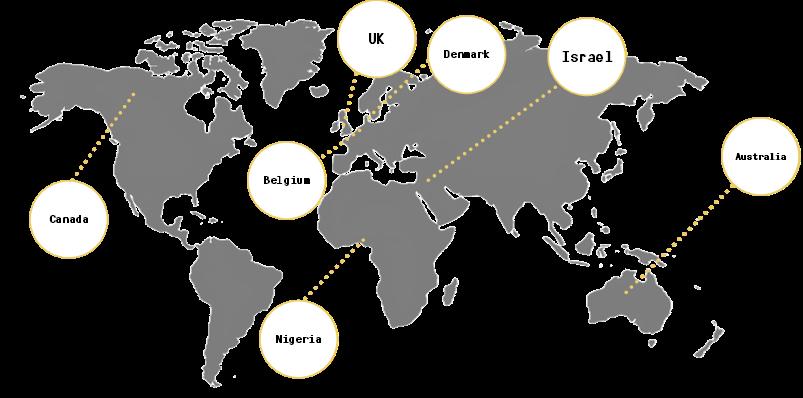

The SEB centenary year has been a successful period for the membership division, marked by the first increase in membership since 2017 and the society's largest membership total since 2020 at 1286 members. Compared to September 2022, there has been a notable increase of 15.2% in the total SEB membership base. (see fig. 15) This growth stands in contrast to the academic membership sector, which is generally experiencing a gradual decline in subscriptions (Memberwise, 2023).
As of December 31st, 2023, the SEB had 1286 active memberships, with a detailed breakdown provided in fig. 16. In comparison to 2022, Full membership remains the most popular option, comprising 43% of the total membership, down from 50%. Notably, Student membership has experienced significant growth, now constituting 36% of the total, representing a 6% increase from 2022 figures. Early Career Researchers represent 16% of the total membership base, marking a 2% decrease since 2022.



On-site payments
Throughout 2023, funds were allocated, and processes were implemented to enable the SEB to actively recruit new members and capture renewals on-site at events. The SEB is now equipped with an iPad for collecting membership details, and a card reader. This new functionality was tested at the SEB Centenary conference and fully implemented at the September PEPG Field Techniques Workshop in September 2023. Given

the large proportion of non-members at this event, we successfully converted 48% of non-members to join the SEB



while also capturing renewal payments for existing members:
• SEB Centenary Conference: 1 new member, 3 renewals.
• PEPG Field Techniques Workshop: 17 new members, 5 renewals.
In early 2023, adjustments were made to our renewal communications to ensure all email content was reviewed and system emails populated. Further refinements to the email content are ongoing, and delivery frequency has been adjusted to enhance the effectiveness of the renewal campaign.
Following investigations, we can attribute low renewal rates to system limitations, e.g. members cannot adjust their subscription length. Work has been started to adjust this process on the CRM to be fully implemented in 2024.
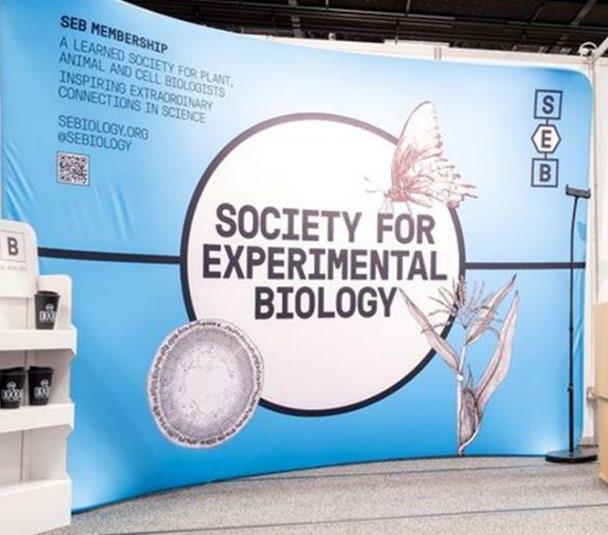
In response to improvement requests noted after the 2022 Society
conference, a new portable, reusable stand was designed, which was utilised at the centenary conference. This stand can be used year after year, is transportable, and will represent the Society at other events outside of the annual conference.
As mentioned previously, the centenary conference marked the introduction of our on-site payment software, facilitating membership and event payments, including those for the awards dinner, for the first time. To raise awareness of this new functionality, increased advertisement of this option will be added to the SEB event portal for 2024.
Throughout 2023, the advertisement of the SEB's member benefits has seen continued improvements. Holding slides have been created for use at various events and lectures to summarize the benefits of joining the SEB.
In December 2023, initial conversations began between the SEB and Underline, the facilitator of the hybrid element of the conference, to convert the SEB conference library for the 2022, 2023, and upcoming 2024 conferences into member-only accessible content. This initiative aims to further bolster the resources available to members at all career stages.

THINK Membership Survey, 2023.
Alongside 160 other societies, the SEB participated in a comprehensive membership communications survey conducted by Think in August 2023. Their final report highlighted that 70% of organizations lack an adequate onboarding series for new members, while only 15% of organizations report their emails are highly segmented. This indicates that a large proportion of societies have yet to fully explore targeted communications (Think, 2023).
These focus areas were initially highlighted in the original SEB member strategy and continue to pose challenges to the sector. Considering the cost-of-living crisis, it is crucial to consider how the SEB’s value proposition is communicated to our membership base.
Ideas from this survey have been included in the September 2023 membership strategy refresh to ensure our strategy aligns not only with the challenges facing our society but also with the wider sector, ensuring we keep up with developments.
This report offers an overview of the communication activities and
initiatives implemented throughout the preceding year.
Promotion, via advertising, social media and email, was a key element in ensuring the success of the centenary events and initiatives over the past year.
- Centenary dinner
- Training and career workshops
- Edinburgh Annual Conference
- Plant Environmental Physiology Group (PEPG) Workshop 2023
The SEB communications team has been looking at effectively communicating all the Society’s activities and new initiatives both internally - to SEB committee members, and externally - to members and the public, to help raise awareness of all the Society’s offering and opportunities for involvement.
Moreover, SEB has enacted various enhancements in our communications, including the expansion of our audience base and the introduction of new content initiatives.
Below we outline the improvements and initiatives communications team implemented over the past 12 months.
The key email communications fall into three categories:
- Newsletters
- Event emails
- Magazines emails

The SEB newsletter is distributed on a monthly basis, on the last Friday of each month.
In order to increase SEB visibility of Society’s activities we have reviewed the newsletter and introduced a number of improvements, see metrics below:
8,452 impressions
2,074 reads 04:45 mins average read time
72 clicks
424 downloads
Emails metrics:
Between March 2023 and the 20 March 2024, we have sent a total of 105 emails (including automatic ones) to our members regarding:
- Centenary Conference
- Centenary dinner
- Prague 2024 Conference
- Joint cell symposium
- Newsletter
- SEB spring & Autumn Magazine 2023
- Webinars
The general open rate for these emails equals to 25,2%.
(Compared to an average open rate of 21.5%: Campaign Monitor, 2022)
Newsletter available for general audience (non-SEB members):

We are pleased to announce that due to popular demand for access to our newsletter, we have decided to make it more widely available to a more general audience (over just members.) We have adapted the format to ensure inclusivity, removing content and benefits previously exclusive to our members. This adjustment reflects our commitment to expanding our reach and providing valuable insights to a broader community.
Webinars
In regard to, our webinars and events, we have maintained an excellent publication pace in alignment with the agreed timelines:
- A month before - A week before
- The day before
SEB Centenary Conference
Twitter activity pre-conference saw a significant increase in June 2023 (38 new members), followed by an even more substantial growth postconference in July (279 new members).
A total of 189.4k impressions were recorded during these two months.
Due to the success of the conference across our social media platforms, the number of visits on both platforms was considerable, with over 2,815,000 visits for the time period.
This has ensured unparalleled visibility for us, surpassing the levels of the past three years.
The abstract book for the Centenary Conference was provided in hard copy and electronically and was well used. (See Fig 20-22)
We also implemented a social media wall on-site, not only to disseminate key event information, but also to showcase all social media activity pertaining to the conference.
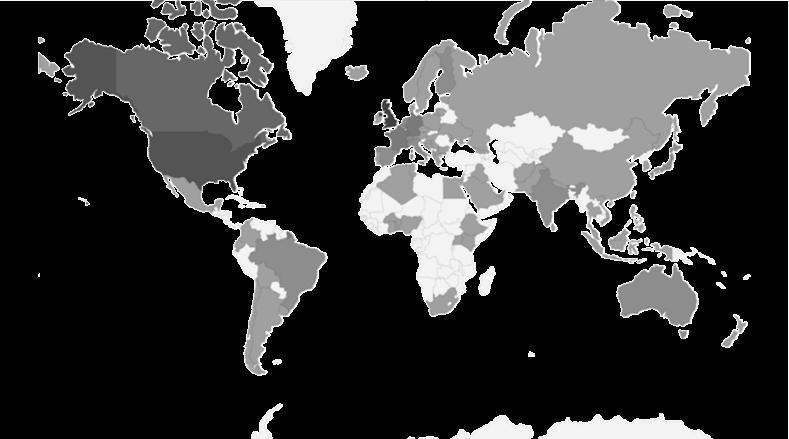



Fig.22: Heatmap showing countries who viewed the Edinburgh Programme.
Top 10: UK (601), USA (224), Canada (181), France (119), Germany (100), India (88), Spain (70), Italy (54), Finland (47) and Japan (47).

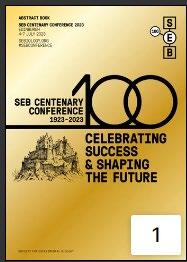





Live social media walls were projected on the walls by the main reception desk in Edinburgh.
An extensive advertising campaign took place ahead of the Plant Environmental Physiology Group (PEPG)’s Field Techniques Workshop took place from Sunday, 10th September to Friday, 15th September 2023.
On 23rd November 2023, SEB held a special dinner to mark the end of the centenary celebrations. The communications team worked closely with the OED team; we are delighted to be able to provide members with a memory of the event and provide all the pictures of this event here, available to the public.
A news article, capturing the memories of this special Centenary event, was published on the SEB website. It is accessible via this following link.
Magazine Metrics
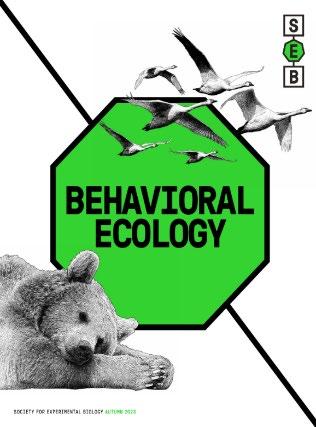




Enhanced accessibility: interactive magazine archives now available online
During 2023 we undertook some work to upload all the previous editions of the magazine, onto our website. These editions are now available to download online here.
SEB SPRING 2023 MAGAZINE


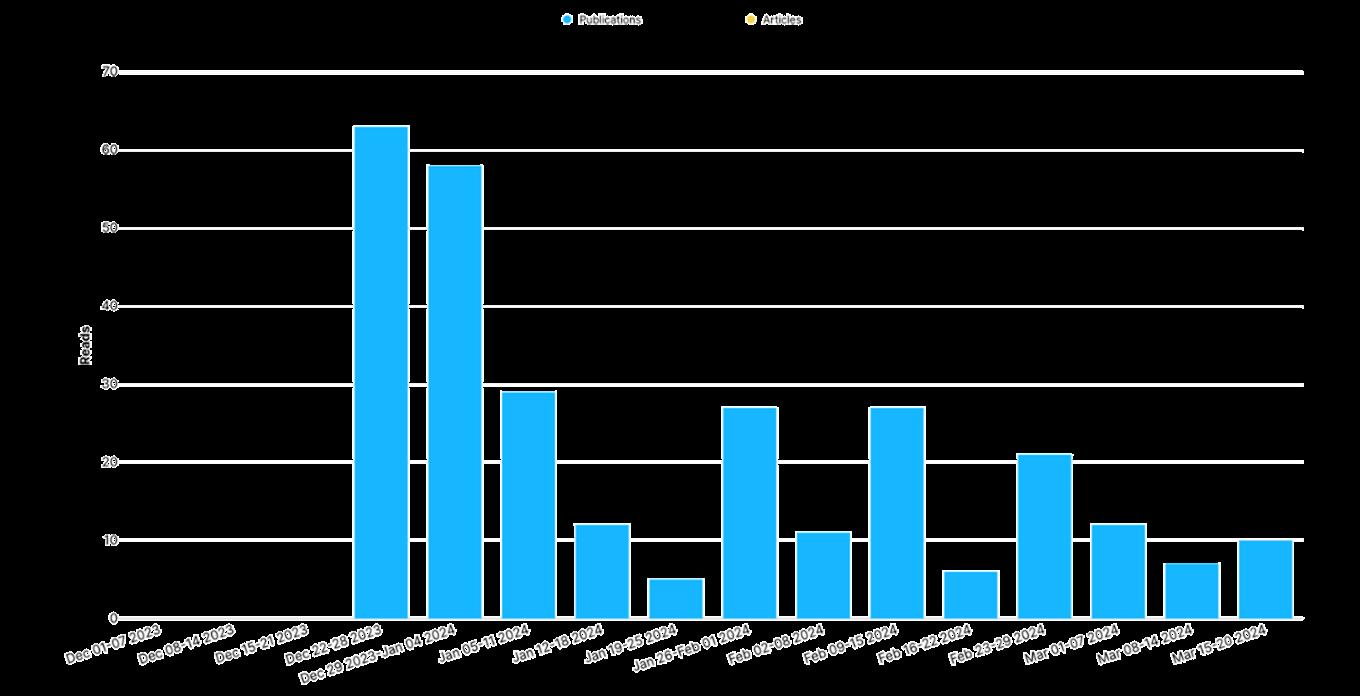
The Society continues to be active on five social media platforms: X, LinkedIn, Facebook, Instagram, and YouTube.
SEB members' preferred platform is X (formally Twitter), as such, we have focused the majority of our efforts to connect with the scientific community on X.
In the past twelve months, we have shared the activities, benefits, and opportunities for members on Twitter and have noticed the following results:
• Significant increase in profile visits.
• Increase in Number of followers.
• Increase in number of mentions (7597 in March 2023 to 8486 in March 2024) (+11,85%).

Please see below metrics highlighting our increased activity (number of posts) and the impact of this in terms of following, interactions (mentions) and increased visibility (profile visits):
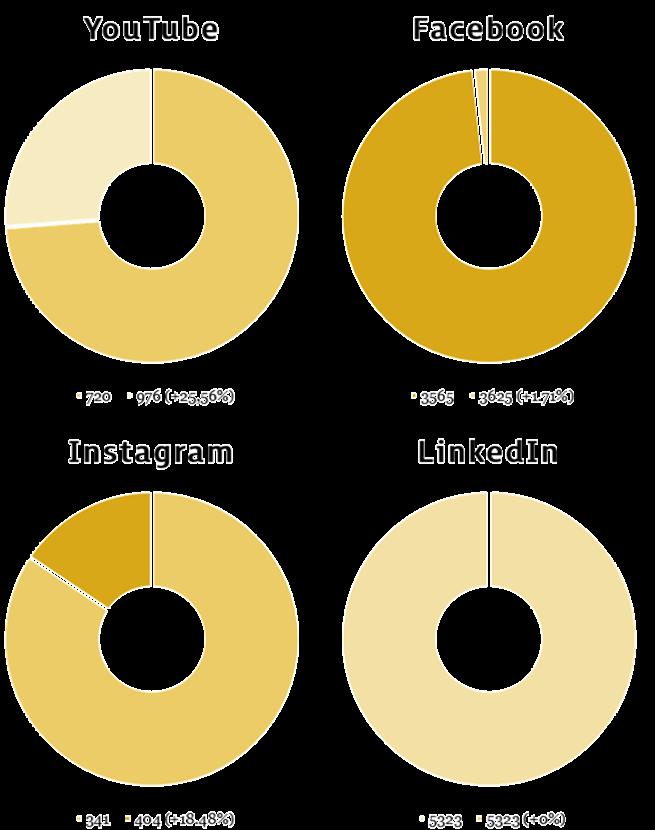
25: Graphs showing the increase in SEB subscribers across social media platforms.
Updated metrics from March 2023 to March 2024:
• YouTube
March 2023: 720
Today (March 2024): 976 (+35,56%)
March 2023: 3565
Today (March 2024): 3626 (+1,71%)
March 2023: 5323
Today (March 2024): 5323 (0%)
March 2023: 341
Today (March 2024): 404 (+18,48%)
BlueSky account
Thanks to Claire Holden, a JXB Assistant Editor and the rest of the JXB team, SEB has opened an account on Bluesky, a promising new social network.
Bluesky's innovative features offer us the opportunity to engage with a wider audience and enhance our digital visibility.
The Society owns five scientific research journals. These journals rank highly among other journals publishing similar scientific content
and are well-regarded by the communities they support.
Journal-level metrics in 2022 (announced in June 2023)
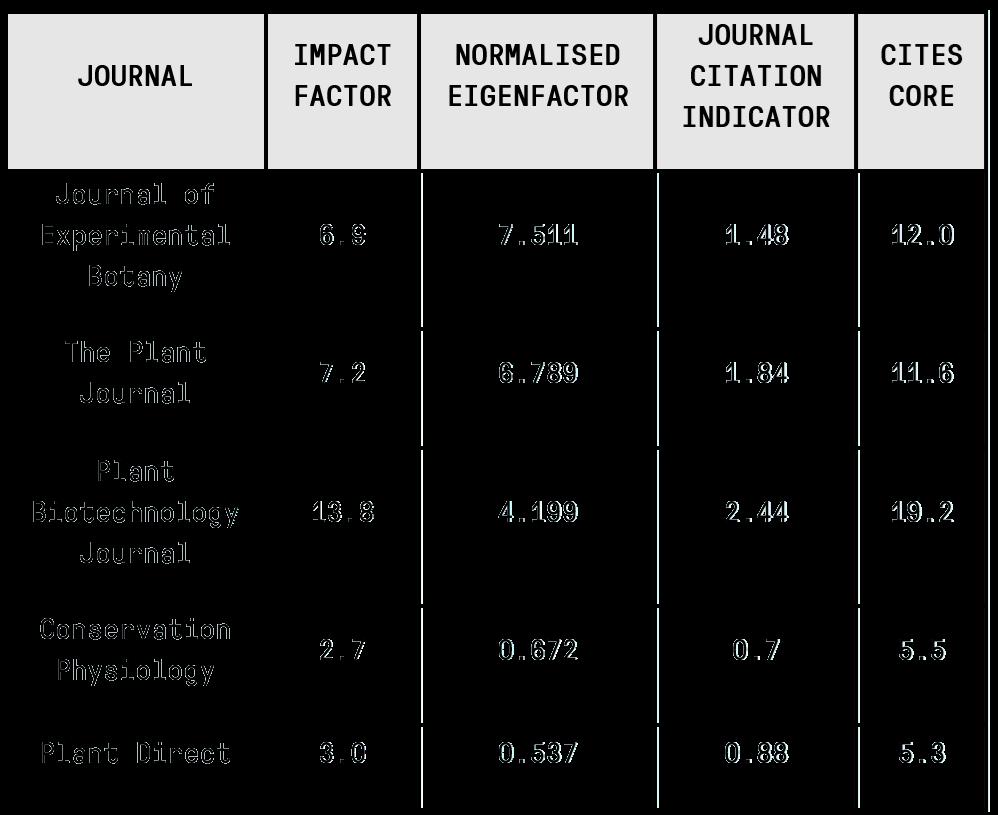
Fig. 26: Table showing the metrics of SEB’s Journals in 2022 (Published June 2023)

Journal Impact Factor = the yearly mean number of citations to items published in the previous two years.
Normalised Eigenfactor = the total importance of a scientific journal (incoming citations from highly ranked journals score more highly).
Journal Citation Indicator = normalises mean citations for topic, article age and article type.
CiteScore = similar to impact factor but referenced to the Scopus database, and includes items published over the previous four years instead of two years.
The Journal Risk Register was reviewed in November 2023, with no major amendments. This will be

reviewed again in November 2024. The major risks remain as follows: switching the Society’s hybrid journals to an open access model, the level of service provided by the journals’ publishers, and the reliance by some of the Society’s journals on a specific market for submissions.
The Plant Journal is a hybrid journal co-owned by the SEB and Wiley. The Editor-in-Chief, Lee Sweetlove, reached the end of his term; the Society is very grateful for all the hard work, dedication and successes he brought to the journal. After an open call, the SEB appointed Katherine Denby as the new Editor-in-Chief, with her term starting in January 2024 following a hand-over period.
Plant Direct is a sound-science journal co-owned by the SEB, Wiley and the American Society of Plant Biologists (ASPB). The journal receives rejected manuscripts from the SEB’s other plant science journals, as well as from other relevant plant journals published by Wiley, thereby representing a mechanism to retain manuscripts within the Society’s portfolio.
Plant Biotechnology Journal is coowned by Wiley, the SEB and the Association of Applied Biologists (AAB). The journal was included in a Wiley transfer arrangement that includes The Plant Journal and Plant Direct, to provide a pathway to retain rejected Plant Biotechnology Journal manuscripts within the SEB journal stable.
Conservation Physiology is co-owned by the SEB and Oxford University Press (OUP).
Steve Cooke, the Editor-in-Chief announced his intention to step down from the role, having been in post since the journal launched in 2013. The Society is extremely grateful to the dedication, hard work and success he brought to the journal. After an open call, the SEB appointed Andrea Fuller. Following a transition period, the new Editor-in-Chief will start in July 2024. Responsibility for the Conservation Physiology editorial office transitioned from OUP to the Lancaster editorial office in January 2023. This transition was smooth, and the SEB editorial staff now have better oversight on the final quality of output for Conservation Physiology.


The Journal of Experimental Botany is a hybrid journal owned by the SEB and published by OUP. Throughout 2023 and early 2024, the SEB conducted a full assessment of switching the journal to open access in 2025 – see the ‘Open Access’ section below for more detail on this.
Income to the Society from each journal in 2023 is given below, with data from the preceding three years for comparison.
At The Plant Journal, subscription revenue decreased by 6%, but open access revenue increased by 42%.
Total journal revenue increased by 3.5% versus 2022.
£100,000
£0
The SEB receives a royalty (30% of revenue, also 3.5% up on the previous year) and so publisher costs do not affect the SEB’s income from The Plant Journal.
£180,000
£160,000
£140,000
£120,000
£100,000
£80,000
£60,000
£40,000
£20,000
The SEB receives a royalty (20% of revenue) for Plant Biotechnology Journal and so again publisher costs do not affect SEB income.
Journal revenue and SEB profit in 2023 increased by 53% versus 2022.
As the journal is open access, revenue depends almost exclusively on open access income.
Compared to 2022, submissions were lower in 2023 but the acceptance rate was higher.

£40,000
£35,000
£30,000
£25,000
£20,000
£15,000
£10,000
£5,000
£0
£70,000
£60,000
£50,000
£40,000
£30,000
£20,000
£10,000
£0
£900,000
£800,000
£700,000
£600,000
£500,000
£400,000
£300,000
£200,000
£100,000
£0
£784,843
The SEB receives a share of the profit (30%) for Plant Direct.
Revenue decreased 15.7% in 2023 versus 2022 due to fewer papers being published. Costs were also 20% higher due to editor travel expenses and increased marketing.
Consequently, SEB income in 2023 (which includes transfer bonuses for other SEB journals that transfer to Plant Direct) was 21.8% lower than the previous year.
The SEB receives a share of the profit (50%) for Conservation Physiology.
The number of published papers increased in 2023, resulting in higher revenue through open access payments.
The financial structure of the new contract means that SEB-side costs are accounted for in the SEB income figures for the first time in 2023.
SEB income from the journal rose by 14% in 2023, but given the change in financial structure, this is an even bigger increase.
The SEB receives a share of the profit (69%) for the Journal of Experimental Botany.
Subscription income declined by 1.5% versus 2022, while open access income rose by 10%.
Costs were well controlled and consistent with output.
Journal profit was 1.2% lower than in 2022.
The SEB receives a payment from OUP for the editorial costs, and any underspend will be held in a fund to support the future transition of the journal to Open Access.

Expansion of the SEB’s publishing portfolio would provide an additional income stream in publishing and help to reduce risk across the portfolio. During early 2021, the chair of the SEB Publications Management Committee meeting asked for ideas for a new SEB journal. Two proposals were received, and the more viable of these suggestions, a proposed cell science journal was taken forward. The SEB contacted a range of potential publishers and worked with one publisher to further develop the proposal, however, in late 2023 the Society decided to put the new journal plans on hold following a number of practical difficulties, perhaps in part reflecting a lack of interest from the community.
The Society is committed to regularly considering new ventures in publications; ideas for new publishing opportunities will continue to be sought regularly at the Society’s Publications Management Committee meetings.
The SEB relies on its two hybrid journals (Journal of Experimental Botany and The Plant Journal) for a large proportion of the Society’s income. The SEB is committed to switching these journals to an openaccess model and, when this happens, the income they generate will reduce significantly. Both publishers continue
to announce additional Read & Publish deals with specific consortia, allowing researchers in represented institutions to continue to publish in the Society’s hybrid journals. Uptake has been close to projected levels, but the publishing fee paid by researchers through these deals is lower, often substantially so, than the fee for direct payments. Subscription income has also declined because of cuts to library budgets and the move towards supporting open access. During 2023, the Society continued to work with the publishers (Wiley and OUP) to monitor the situation.
The Society received a financial proposal from OUP for switching the Journal of Experimental Botany to an open-access journal in 2025. After extensive analysis of the effect this would have on the journal and the income it provides to the Society, at a special Council meeting in February 2024, Trustees decided to delay transitioning the Journal of Experimental Botany to open access.
The Publications Management Committee will continue to monitor the performance of the journal (submissions, income streams, OA uptake) and the open access environment in general and will, at least annually, discuss internally how the journal is positioned for a flip. The next full financial reassessment of the decision to flip is planned in 2027 for a 2028 flip, to coincide with the end of the journal’s current publishing contract.

Our publications were also made centre stage as part of our centenary celebrations. A review of initiatives used to celebrate the Centenary through our journals included:
• Editors of each Journal wrote letters for the SEB magazine reflecting on the past 100 years of experiential biology and where they envision the next 100 years will lead us
• A collection of articles across all journals was collated. This was entitled “Science with Impact Article Collections” and featured papers across the history of the journals that have had high impact in their subject areas.
• A series of interviews with early career scientists who show exceptional promise in their field was published across the year.
• The Journal of Experimental Botany published special Centenary Reviews
• SEB Journals ran a workshop at the centenary conference on creating figures for papers
London Accommodation
Staff have been home-based since March 2020. The Society retains a

contract with the FORA (formally TOG) who manage Tintagel House, which serves as a postal address. In person staff meetings take place from time to time across the year alongside a mixture of virtual and in person governance meetings.
Lancaster Accommodation
SEB (JXB) staff continue to predominately work from home although have the option of using the offices within the University of Lancaster where the Registered Office is for SEB:
County Main, AO12/AO13, Lancaster University, Bailrigg, LA1 4YW
Infrastructure improvements continued in 2023, a significant amount of work was done to ‘clean’ and update the data held in the CRM.
In 2023, we created a strategic IT and data plan to identify risks and outline risk mitigation strategies in our IT practices in three different areas: Cyber Security, Data Storage and GDPR. As part of this initiative, we began work with KCS to gain our Cyber Essentials certification, which we expect to complete in early 2024.

In July 2023 the Society appointed Professor Gudrun De Boeck to be the Vice President.
Professor Tracy Lawson became the President in July 2023. Professor Lawson will serve until July 2025.


Professor De Boeck is studying the effects of environmental factors on fish. She will serve two years as Vice President and take up the role of President in July 2025.
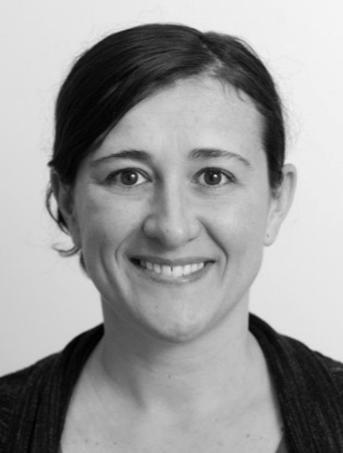

Professor Rosangela Sozzani joined as the Cell Section Chair and will serve her first fouryear term until 2027. Her research focuses on molecular mechanisms of multicellular organisms.
Doctor Robyn Emmerson was appointed as the Early career Researcher trustee and will serve her first 2year term. Her work focuses on plant epigenetic pathways.
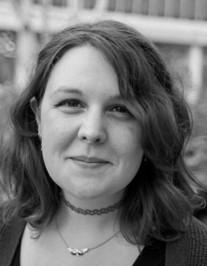

The Society was also pleased to confirm that Professor Felix Mark was appointed for his first full fouryear term as the Animal Section Chair and Professor John Love was appointed for his second four-year term as Treasurer.
On 22nd November 2023, a staff and trustee training session was held in London. Two sessions were held: Promoting Collaboration and an Inclusive Culture by Brenda Lewis from Advance HE. The second session was delivered by Shachi Blakemore from Buzzacott regarding a trustees’ role and responsibilities, including legal requirements, risk management and financial governance.
In 2024, we plan to hold further training sessions for staff and trustees, to refresh the training.

In September 2024, a trustee information pack and webpage was launched, containing useful information for trustees, such as governance; the role of a trustee; financial responsibilities; SEB structure; diversity, equality and inclusion; and holding effective meetings.
The following staff changes were made in 2023:
After an open call, Claire Holden was appointed as an Assistant Editor in the Lancaster editorial office during 2023 as maternity cover.
Sarah Ellerington joined the team as the Governance Officer in May 2023.
The Society hired an external events manager to help deliver the Edinburgh centenary conference; Olivera Peroli Žodan was a member of the Underline Team (AV support for conferences) and worked as the events manager from May to July 2023.
Louise Tully was appointed as the events manager in October 2023.
STRUCTURE AND ARTICLES OF ASSOCIATION
The formal review of the board and Articles of Association were postponed and will be considered as part of the Strategy refresh, planned for to 2024/25.
REFERENCE
The trustees who are also directors of the charity, for the purposes of the Companies Act 2006, present their report with the financial statements of the charity for the year ended 31 December 2023. This report has been prepared in accordance with Part 8 of the Charities Act 2011 and constitutes a directors’ report for the purposes of company legislation.
The financial statements have been prepared in accordance with the

accounting policies set out on pages 62-65 and comply with the charitable company’s memorandum and articles of association, applicable laws and Accounting and Reporting by Charities: Statement of Recommended Practice applicable to charities preparing their accounts in accordance with the Financial Reporting Standard applicable in the United Kingdom and Republic of Ireland (FRS 102).
ADMINISTRATIVE DETAILS
Registered company number: 1314879
Registered charity number: 273795
Registered office: County Main, AO12/AO13, Lancaster University, Bailrigg, LA1 4YW
Professor Tracy Lawson, University Professor, President until July 2025
Professor Gudrun De Boeck, University Professor, Vice president from July 2023 and President from July 2025.
Professor John Love, University Professor, Treasurer.
Dr Felix Mark, Research Scientist, Animal Section Chair.
Professor Rosangela Sozzani, University Professor, Cell Section Chair.
Professor Stefan Kepinski, University Professor, Plant Section Chair,
Dr Robyn Emmerson, Research Fellow, Early Career Scientist Trustee.
Professor Martin Parry, Publications Officer, University Professor.
Professor Sheila Amici- Dargan, OED Trustee, Associate Professor.
Ms Ji Young Park, Independent trustee.
The Chief Executive Officer, Pamela Mortimer, also serves as the Company Secretary.
Buzzacott LLP, 130 Wood Street, London, EC2V 6DL
JS2 Ltd provide financial services including the preparation of the annual financial statements.
NatWest is the principal bank for the Society, in addition accounts are held with Skipton Building Society and NS&I
The Society for Experimental Biology is a company limited by guarantee

governed by its Memorandum and Articles of Association dated 24th May 1977 and amended to ensure correct references to the Companies Act, 2006
and new governance arrangements on 1 July 2011. The Society is registered as a charity in England and Wales (Registered charity number: 273795).
Society is funded by subscriptions from its members, gifts from donors and the income generated from its activities (largely from its scientific journals) and investment income. Every member agrees to contribute £1 in the event of the charity being wound up.
The trustees are: the President, Vice President, Treasurer, Publications Officer, Animal Section Chair, Cell Section Chair, Plant Section Chair, an Outreach, Education and Diversity Trustee and an Early Career Scientist or Researcher Trustee plus one or two independent representatives who sit on the Council as well as the Audit and Risk Committee and the Human Resources and Remuneration Committee.
The section chairs are nominated and elected by the members of the Society. The Vice-President is nominated by each section (on a rotational basis every two years) and then appointed by Council. The appointment is for two years after which the Vice President is appointed President for a further two years.
The independent members are appointed by the Council after a process of selection with the Council being mindful of any shortfall in
knowledge or experience within its ranks.
New members of the Society's Council receive written information on the Society and the obligations of their position.
The Council received trustee training in November 2023 (provided by Buzzacott, the external auditors.)
The Board of Trustees serves as the Council of the Society and guides the strategy and administration of the Society. The Council meets at least three times a year and there are committees covering each the following: scientific themes of the Society (Animal, Cell and Plant Biology), Outreach, Education and Diversity, Audit and Risk and a Publications Management. All the above committees are chaired by one of the Society's trustees.
The centenary management committee (established in late 2021 to plan for the Society’s centenary and is chaired by the Outreach, Education and Diversity Manager) was very active during 2023.
In addition, there are ad hoc working groups to focus on targeted areas of business.

A Chief Executive Officer (CEO) is appointed by the trustees to manage the day-to-day operations of the charity within a delegation framework approved by the Council.
The key management personnel in charge of directing and controlling the charity on a day-to-day basis comprises the trustees and the Chief Executive Officer. Trustees are not remunerated for their role as trustees to the Society. Details of remuneration paid to key management personnel is set out in note 7.
The Society does not actively engage in traditional forms of fundraising activity such as collections or appeals, and as such, the trustees do not consider it necessary for Society to adopt any particular code of practice in this area, or to enlist the support of third parties. No complaints have been received by the Society in relation to fundraising.
The Council of the Society is responsible for the management of risk.
The Audit and Risk Committee regularly reviews the Society's risk register, and the Council annually reviews the major risks to which the Society is exposed and the systems
that have been established to manage those risks.
Delegated authority has been given to three trustees, the President, Vice President and Treasurer to take decisions on behalf of Council on matters arising that need resolution in between regular Council meetings. These trustees work with the CEO to resolve and/or mitigate any emerging issues.
Internal control risks are minimised by implementing procedures for authorisation and monitoring of expenditure. A key element in the management of financial risk is the setting of a reserves policy and its regular review by the Audit and Risk Committee, which advises the Council.
The principal risks and uncertainties identified by the trustees and how these risks are being managed is set out below:
The main financial risk to Society continues to relate to its dependency on income from publishing activities.
Changes in financial models within the journal publishing sector create concern and uncertainty in the sustainability of the revenue streams and their respective surplus margins. In particular, these include the move away from the subscription to Open Access model, and the impact of

‘cOAlition S 2’ and associated initiatives from research funding bodies. The Society has two journals that are not Open Access and with the publishers (Wiley Blackwell and Oxford University Press) it continues to proactively engage with developments in this area.
Whilst publishers are taking action with regard to read and publish deals, this may adversely impact other income streams within existing contracts. We are keeping this situation under review.
In November 2023, the Society decided to undertake a full-scale review of the feasibility of changing the business model for the Journal of Experimental Botany from a standard hybrid journal to an Open Access journal. Further information is provided on page 46.
The trustees consider the global fluctuations in investment fund values and variability of investment returns to be a risk for the Society and are cognisant that markets have fluctuated significantly due to the pandemic and other world events.
The Society investments are held in a medium risk portfolio that is actively and expertly managed and administered by Brooks Macdonald.
2 www.coalition-s.org/ Is an initiative to make full and immediate Open Access to research publications a reality; it was formed by a group of national research funding
Funds are invested in a diverse portfolio comprising commodities, equities, bonds and gilts. This managed strategy mitigates fluctuations in fund values and seeks opportunities for fund growth and income. The trustees consider this approach helps to mitigate the subsequent exposure to any investment risk.
The Trustees’ have agreed that the portfolio will be reviewed every three years, with 2023 being the first year. Consideration was given to the ESG elements of the portfolio linking to the new standards for the investment industry. Following a recent review with the investment managers, Council agreed that the investment portfolio will continue to be managed as a medium risk portfolio, which is considered appropriate given the longterm aims and objectives of the Society remain unchanged.
There is a reliance on the Annual Conference to recruit and retain members; the income generated from membership is not a significant income stream (currently around £40K/<2%) and we deliberately choose to significantly offset the cost of delivering the conference to those members who choose to attend. We

organisations, with the support of the European Commission and the European Research Council (ERC).
need to keep the level of subsidy under review.
We also acknowledge the potential (developing) risk that there may be a change in consumer attitudes to whether they choose to attend the conference in person. To address this risk and provide opportunities for those less able to travel or able to afford to attend in person to participate we have chosen to continue to provide conference attendance as part of a hybrid conference plan. The hybrid element is at an additional cost to the Society and we will continue to keep this under review.
Investment policy and performance of investments:
All funds of the Society not immediately required to be used or applied for the ordinary purposes of, or in carrying out the objects of, the Society and any property held by the Society, subject to the terms of any trust, may be invested by the Board of Trustees on behalf of the Society in any permitted investment.
The Board of Trustees may appoint and terminate the appointment of investment managers upon such terms and conditions as the Board may from time to time determine, except that no person should be appointed as
investment manager unless authorised for this purpose in accordance with the Financial Services Act 2010 or any statutory modification thereof or replacement thereof.
Under delegated authority from the Board of Trustees, administration of the funds of the Society and all financial matters relating to the Society, subject to the overall authority of the Board, are conducted by the Audit and Risk Committee. The principal custodian of investment securities is Brooks Macdonald.
Surplus cash is held in deposit accounts with the Society's bankers, NatWest.
The market value of investments at 31 December 2023 was £5,018,150 compared with £4,657,610 at 31 December 2022.
Income and Interest from investments during the calendar year 2023 amounted to £89,050.24 (2022: £51,751) representing an income yield of approximately 1.77% (2021: 1.13%) based on the portfolio value as at 31st December 2023. The total return on the portfolio for the 12 months to 31 December 2023 was 7.74% compared to the MSCI PIMFA 3 Balanced Index which returned of 5%..
On review the Trustees are content with the annual performance of the fund.

The Audit and Risk Committee has considered the Society's reserves requirements and advised on the same to the charity's Board. When reviewing the reserves policy, the Audit and Risk Committee and the Board considered the points below.
Part of the charity's net assets is represented by the net book value of Society’s interest in its tangible and intangible fixed assets. The availability of these assets is essential to the day-to-day work of the charity and as such, the value of these assets cannot be regarded as funds that would be realisable with ease, in order to meet future contingencies. As such, an amount equal to the net book value of the tangible fixed assets has been separated from the charity's general funds and held as a separate designated fund. At the year end, the balance on this fund was £91,110 (2022: £120,045).
At 31 December 2023, funds totalling £32,272 (2022: £35,214) comprised restricted funds which must be applied in accordance with the wishes of the donor.
A designated investment fund is held to match the value of the investment portfolio. The value of the fund is held to create long term investment return and to help fund the day-to-day operations of the charity. At 31 December 2023, this amounted to £5M (2022: £4.7M).
Following a review in late 2023 of the Journal of Experimental Botany’s publication business model, Council decided in February 2024 to formally designate a fund to support future transitions in publishing model for two of the Society’s journals: the Journal of Experimental Botany and The Plant Journal. Any surplus generated from the JXB publications contract in 2023 will be transferred to the Publications Open Access Designated Fund. The designated fund at the 31st December 2023 was £300,000. In addition, following analysis of the year end accounts, the Treasurer and CEO made a recommendation to the Audit and Risk committee, and then Council, of a possible transfer of further additional surplus however it was decided not to transfer any additional funds.
At 31 December 2023, the charity held free reserves totalling £3.6M (2022: £3.2M). The free reserves held represent 1 years and 10 months operating expenditure. The trustees are satisfied with the level of free reserves held as at the 31 December 2023, as this meets the requirement of 2 years' operating costs that, in the very unlikely event of the Society's demise and becoming insolvent, would be required to responsibly wind down the Society.
The trustees have assessed whether the use of the going concern

assumption is appropriate in preparing these financial statements. The trustees have made this assessment in respect to a period of one year from the date of approval of these financial statements.
The trustees of the charity have concluded that there are no material uncertainties related to events or conditions that may cast significant doubt on the ability of the charity to continue as a going concern. They are of the opinion that the charity will have sufficient resources to meet its
liabilities as they fall due. The most significant areas of judgement that affect items in the financial statements are detailed above. With regard to the next accounting period, the year ending 31 December 2024, the most significant areas that affect the carrying value of the assets held by the charity are the level of investment return and the performance of the investment markets.
Information regarding SEB’s financial policies can be found in the notes to the financial statements: pp 66-74.
The major and significant piece of work undertaken in the first quarter of 2024 was a full analysis of options to change the publication model for the Journal of Experimental Botany, JXB. A working group was established to undertake the financial analysis relative to options to flip the journal from a standard hybrid model to an Open Access journal. A special Council meeting was held in late February. Council considered whether JXB should be flipped, when it should be flipped and how to prepare to support the flip.
The financial modelling showed that:

• Flipping JXB to an open access model carries an enduring financial risk for the SEB, totalling approximately £2M£3M compared to the current performance of the hybrid model.
• The annual loss of income would persist between 5-10 years and have long-term implications for the Society’s other activities and income streams.
In response, Council decided not to flip JXB at the present time and agreed:
• that they should review the option to flip JXB to OA at least every three years.
• A designated fund entitled ‘Publications Open Access Designated Fund’ should be established; any underspend on the JXB editorial budget should be added to the fund each year (starting with an ingress of funds from 2023 underspend) and consideration given to allocating underspend from the general SEB budget.
The Society is determined to improve on and follow best practice where possible on our data and information management processes. In 2024, we have made good progress towards this goal, in line with the SEB IT and Cyber Security Strategy, started in 2023.
Work has continued to optimise useful output from the Pixl8 CRM system. Since the beginning of 2024, several areas have undergone review, and we continue to test the system to maximise the functionality of the CRM.
The Society is committed to being as transparent as possible on activities undertaken by Trustees on SEB related business. Some Trustees receive honoraria payments for providing editorial services for scientific journals, including for the journals that are either wholly or partially owned by the Society.
SEB Trustees and/or the Executive do not have any influence on any such editorial appointments (except for those of the Editor in Chief, and this is currently not relevant) however the Society has decided to monitor and record all such activity and any honoraria received by Trustees from the separate legal entity of any Journal where we have a part or full ownership. We have set up system for tracking such appointments and associated remuneration (see below) and will declare any such activity in the financial notes to the annual accounts from 2023 onwards.
A special Council meeting was held in March 2024 to consider whether several Trustees could be in receipt of an honorarium for providing editorial services for SEB journals.
They considered the current provision of service by the Trustees, relevant sections of the Charity Act 2011 and the SEB Articles of Association and agreed that the three trustees, to which this is applicable, can concurrently serve in the roles of Trustee and editors and receive an

honorarium for the latter. Council approved contracts for the Trustees who would be serving as editors in 2024. Correspondingly, for full transparency, details of the honoraria will be made in the financial notes (related party declarations) to the annual report and accounts. 4
Louise Tully, the Events Manager resigned and left her post in the middle of February 2024. This presented an opportunity to assess and review the functions within the wider team and identify the required resources to ensure the events team can best meet the needs of the Society going forward.
To ensure the least amount of disruption for the Society and best support the successful delivery of the forthcoming annual conference (to be held in Prague in July 2024) it was decided to promote the two Events Officers to interim Events Managers, obtain additional event supervision from the current Membership Manager and recruit an administrator to support events, grants and membership during a six-month period, March to September 2024.
The Society will continue to deliver across all the pillars of the main Strategy.
Key objectives, by topic, for 2024 include:
Governance
The Society will look to appoint the following Trustees in 2024:
Information and Cyber Security Trustee; this would be a new independent Trustee position.
Publications Officer
Plant Section Chair
OED Trustee (reappoint incumbent for a second term)
The Society will hold a series of meetings with staff and Trustees to begin to review the strategic plan and agree a revised plan for 20252030.
Deliver a range of successful SEB sponsored and supported events;
The following events are planned:
• Annual conference to be held in Prague: 2nd-5th July 2024.
• Cell Symposia in Clermont Ferrand, France: 10th-12th July 2024.
• OED Symposia at Imperial College London: 10th-11th September 2024.
• Regular virtual webinars will be held for the SEB journals,
4 Details of trustees’ remuneration can be found in note 6.

highlighting key, high impact papers.
• A range of OED arranged activities for SEB members and the public, such as:
Sponsoring and supporting events from partner organizations, such as the Policy Lates Series run by the Royal Society of Biology.
Careers and Coffee Webinars.
Leaders of the Future Webinars.
Support events with enhanced communications
Plans include:
A range of increased communication campaigns, such as promotional videos; highlighting scientific sessions at events; spotlighting award winners; and news articles on the SEB website.
A new campaign to target sponsors and exhibitors.
Engaging with scientific sections to decide themes for the SEB magazine and conferences.
Continue to deliver high quality peer reviewed journals
Efforts to continue to enhance the relationship between the journals and the Society and demonstrating the impact of the science published in our journals to members and the public will remain a priority in 2024.
As previously stated, we will conduct a thorough analysis of possible flip scenarios will be undertaken.
Planning for JXB 75-year anniversary celebrations in 2025.
The SEB Membership strategy has followed a phased approach, focusing on providing a deeper and more valuedriven member experience with an emphasis on retention, engagement, and recruitment within each membership category.
Our yearly objective for 2024-2025 is to increase engagement and acquire new members at each career stage.
The focus of the strategy in 2024 will be on diversifying the member benefit offering to ensure the SEB continues to meet the needs of its community and provides opportunities for member involvement. This includes providing access to recordings from the 2022, 2023, and upcoming 2024 annual conferences.
The following grants will be administered to the level of finance given during 2024:
The Company of Biologists Travel Grant (£40,000)
The SEB Travel Grant (£20,000)
Funding for Small Conferences (£ 5000)
University Public Lecture Grant(£ 1,000)
Sponsorship for PhD Events(£1,000)
Outreach & Education Grant(£10,000)
Diversity & Inclusion Grant (£ 5,000)
Hardship Fund (£ 1,000)

A new grant, launching in 2024, to support educational research has been approved by council. (£10,000)
In 2024, our OED activities are poised to expand and evolve, reflecting our commitment to fostering inclusivity and engagement within the SEB community. An OED symposium scheduled for September, to be hosted at Imperial College London, will consider the theme of community engagement in bioscience research and education.
SEB is committed to supporting our international membership. With this in mind, we have pinpointed South America as an initial focus for expanding opportunities and strengthening connections in the region. Our goal is to enhance support for both our existing and new members in this area while also forging new partnerships and opportunities to foster interdisciplinary and international collaborations. This marks the initial phase of our strategy, with a comprehensive plan set for the upcoming year. We hope to extend our efforts to other regions in the future if this pilot scheme is a success.
In 2024, SEB is looking to increase our involvement in policy development and advocacy efforts within the biosciences. Our approach begins with closer engagement with partner organisations already active in this area, contributing to government consultations, with a primary focus on the UK and Europe. We plan to conduct a mapping exercise to identify the most relevant policy topics for SEB and those likely to arise in consultations and aim to assemble a group of members with expertise in these areas to provide input for reports, press releases, and comments on policy matters.
Furthermore, we are committed to expanding the visibility of SEB and our members' research through increased media engagement. Building on the success of the press officer initiative at the 2023 Centenary Conference, we will continue this approach for the 2024 conference and beyond. Throughout the year, we intend to publish press releases on topics of interest to our community, showcasing the impactful work of our members and the SEB.

A summary of the year’s results is provided on pages 73-75 of the attached financial statements.
Total income for the year amounted to
£2,880,732 (2022: £2,573,148)
Principle funding sources:
• publications £2,346,041 (2022: £2,307,012)
• meetings and symposia
£293,805 (2022: £150,438)
• membership subscriptions
£43,470 (2022: £46,134)
• investment income £116,970 (2022: £57,880)
grants: £19,096 (2022: £11,684).
Total expenditure for the year amounted to £2,703,741 (2022: £2,204,488).
£2,669,257 (2022: £2,171,014) of the expenditure incurred in the year,

representing 99% (2022: 98%) of the total expenditure incurred, was spent on charitable activities, which includes directly attributable costs, project costs and overhead costs supporting core charitable objectives.
The net income for the year before investment gains and losses was therefore £115,641 (2022: £368,660).
The decrease in net income was due to the increased spend on the Centenary events for the 100-year celebration.
After accounting for the net gains generated on the revaluation and disposal of listed investments totalling £308,434 (2022 – losses £490,817), the charity's overall funds increased by £424,075 (2022: decreased £122,157)
The trustees (who are also the directors of The Society for Experimental Biology for the purposes of company law) are responsible for preparing the trustees’ report and the financial statements in accordance with applicable law and United Kingdom Accounting Standards (United Kingdom Generally Accepted Accounting Practice). Company law requires the trustees to prepare financial statements for each financial year which give a true and fair view of the state of affairs of the charitable company and of the incoming resources and application of resources, including the income and expenditure, of the charitable company for that period. In preparing those financial statements, the trustees are required to:
· select suitable accounting policies and then apply them consistently;
· observe the methods and principles in the Charity SORP;
· make judgements and estimates that are reasonable and prudent;
· prepare the financial statements on the going concern basis unless it is inappropriate to presume that the charitable company will continue in business. The trustees are responsible for keeping proper accounting records which disclose with reasonable accuracy at any time the financial position of the charitable company and to enable them to ensure that the financial statements comply with the Companies Act 2006. They are also responsible for safeguarding the assets of the charitable company and hence for taking reasonable steps for the prevention and detection of fraud and other irregularities. In so far as the trustees are aware:
· there is no relevant audit information of which the charitable company's auditors are unaware;
· the trustees have taken all steps that they ought to have taken to make themselves aware of any relevant audit information and to establish that the auditors are aware of that information.
Approved by the trustees and signed on their behalf by:
Signature:

Trustee:
Approved by the trustees on: John Love 15/07/2024

Independent auditor’s report to the members of The Society for Experimental Biology
Opinion
We have audited the financial statements of The Society for Experimental Biology (the ‘charitable company’) for the year ended 31 December 2023 which comprise the statement of financial activities, the balance sheet, and statement of cash flows, the principal accounting policies and the notes to the financial statements. The financial reporting framework that has been applied in their preparation is applicable law and United Kingdom Accounting Standards, including Financial Reporting Standard 102 ‘The Financial Reporting Standard applicable in the UK and Republic of Ireland’ (United Kingdom Generally Accepted Accounting Practice).
In our opinion, the financial statements:
• give a true and fair view of the state of the charitable company’s affairs as at 31 December 2023 and of its income and expenditure for the year then ended;
• have been properly prepared in accordance with United Kingdom Generally Accepted Accounting Practice; and
•
• have been prepared in accordance with the requirements of the Companies Act 2006.
Basis for opinion
We conducted our audit in accordance with International Standards on Auditing (UK) (ISAs (UK)) and applicable law. Our responsibilities under those standards are further described in the auditor’s responsibilities for the audit of the financial statements section of our report. We are independent of the charitable company in accordance with the ethical requirements that are relevant to our audit of the financial statements in the UK, including the FRC’s Ethical Standard, and we have fulfilled our other ethical responsibilities in accordance with these requirements. We believe that the audit evidence we have obtained is sufficient and appropriate to provide a basis for our opinion.
Conclusions relating to going concern

In auditing the financial statements, we have concluded that the trustees’ use of the going concern basis of accounting in the preparation of the financial statements is appropriate.
Based on the work we have performed, we have not identified any material uncertainties relating to events or conditions that, individually or collectively, may cast significant doubt on the charitable company’s ability to continue as a going concern for a period of at least twelve months from when the financial statements are authorised for issue.
Our responsibilities and the responsibilities of the trustees with respect to going concern are described in the relevant sections of this report.
The other information comprises the information included in the annual report and financial statements, other than the financial statements and our auditor’s report thereon. The trustees are responsible for the other information contained within the annual report and financial statements. Our opinion on the financial statements does not cover the other information and, except to the extent otherwise explicitly stated in our report, we do not express any form of assurance conclusion thereon.
Our responsibility is to read the other information and, in doing so, consider whether the other information is materially inconsistent with the financial statements or our knowledge obtained in the course of the audit or otherwise appears to be materially misstated. If we identify such material inconsistencies or apparent material misstatements, we are required to determine whether this gives rise to a material misstatement in the financial statements themselves. If, based on the work we have performed, we conclude that there is a material misstatement of this other information, we are required to report that fact. We have nothing to report in this regard.
In our opinion, based on the work undertaken in the course of the audit:
the information given in the trustees’ report, which is also the directors’ report for the purposes of company law for the financial year for which the financial statements are prepared is consistent with the financial statements; and
the trustees’ report, which is also the directors’ report for the purposes of company law has been prepared in accordance with applicable legal requirements.
In the light of the knowledge and understanding of the charitable company and its environment obtained in the course of the audit, we have not identified material misstatements in the trustees’ report. We have nothing to report in respect of the

following matters in relation to which the Companies Act 2006 requires us to report to you if, in our opinion:
adequate accounting records have not been kept, or returns adequate for our audit have not been received from branches not visited by us; or
the financial statements are not in agreement with the accounting records and returns; or
certain disclosures of trustees’ remuneration specified by law are not made; or
we have not received all the information and explanations we require for our audit; or
the trustees were not entitled to prepare the financial statements in accordance with the small companies’ regime and take advantage of the small companies’ exemptions in preparing the trustees’ report and from the requirement to prepare a strategic report.
As explained more fully in the trustees’ responsibilities statement, the trustees (who are also the directors of the charitable company for the purposes of company law) are responsible for the preparation of the financial statements and for being satisfied that they give a true and fair view, and for such internal control as the trustees determine is necessary to enable the preparation of financial statements that are free from material misstatement, whether due to fraud or error.
In preparing the financial statements, the trustees are responsible for assessing the charitable company’s ability to continue as a going concern, disclosing, as applicable, matters related to going concern and using the going concern basis of accounting unless the trustees either intend to liquidate the charitable company or to cease operations, or have no realistic alternative but to do so.
Our objectives are to obtain reasonable assurance about whether the financial statements as a whole are free from material misstatement, whether due to fraud or error, and to issue an auditor’s report that includes our opinion. Reasonable assurance is a high level of assurance but is not a guarantee that an audit conducted in accordance with ISAs (UK) will always detect a material misstatement when it exists. Misstatements can arise from fraud or error and are considered material if, individually or in the aggregate, they could reasonably be expected to influence the economic decisions of users taken on the basis of these financial statements.
Irregularities, including fraud, are instances of non-compliance with laws and regulations. We design procedures in line with our responsibilities, outlined above, to detect material misstatements in respect of irregularities, including fraud. The

extent to which our procedures are capable of detecting irregularities, including fraud is detailed below:
Our approach to identifying and assessing the risks of material misstatement in respect of irregularities, including fraud and non-compliance with laws and regulations, was as follows:
• we identified the laws and regulations applicable to the charitable company through discussions with management, and from our commercial knowledge and experience of the sector;
• we focused on specific laws and regulations which we considered may have a direct material effect on the financial statements or the operations of the charitable company, including those that relate to the reporting framework (Statement of Recommended Practice: Accounting and Reporting by Charities preparing their accounts in accordance with the Financial Reporting Standard applicable in the United Kingdom and Republic of Ireland (FRS 102)), the Charities Act 2011 and the Companies Act 2006;
• we assessed the extent of compliance with the laws and regulations identified above through making enquiries of management and inspecting correspondence; and
• identified laws and regulations were communicated within the audit team and the team remained alert to instances of non-compliance throughout the audit. Auditor’s responsibilities for the audit of the financial statements (continued)
We assessed the susceptibility of the charitable company’s financial statements to material misstatement, including obtaining an understanding of how fraud might occur, by:
• making enquiries of management as to where they considered there was susceptibility to fraud, their knowledge of actual, suspected and alleged fraud; and
• considering the internal controls in place to mitigate risks of fraud and noncompliance with laws and regulations.
To address the risk of fraud through management bias and override of controls, we:
• performed analytical procedures to identify any unusual or unexpected relationships;
• tested journal entries to identify unusual transactions;
• assessed whether judgements and assumptions made in determining the accounting estimates set out in the accounting policies were indicative of potential bias; and
• investigated the rationale behind significant or unusual transactions.

In response to the risk of irregularities and non-compliance with laws and regulations, we designed procedures which included, but were not limited to:
• agreeing financial statement disclosures to underlying supporting documentation;
• reading minutes of meetings of those charged with governance; and
• enquiring of management as to actual and potential litigation and claims.
There are inherent limitations in our audit procedures described above. The more removed that laws and regulations are from financial transactions, the less likely it is that we would become aware of non-compliance. Auditing standards also limit the audit procedures required to identify non-compliance with laws and regulations to enquiry of the trustees and other management and the inspection of regulatory and legal correspondence, if any.
Material misstatements that arise due to fraud can be harder to detect than those that arise from error as they may involve deliberate concealment or collusion.
A further description of our responsibilities is available on the Financial Reporting Council’s website at www.frc.org.uk/auditorsresponsibilities. This description forms part of our auditor’s report.
This report is made solely to the charitable company’s members, as a body, in accordance with Chapter 3 of Part 16 of the Companies Act 2006. Our audit work has been undertaken so that we might state to the charitable company's members those matters we are required to state to them in an auditor's report and for no other purpose. To the fullest extent permitted by law, we do not accept or assume responsibility to anyone other than the charitable company and the charitable company's members as a body, for our audit work, for this report, or for the opinions we have formed.
LLP(Jul25,202413:32GMT+1)

(incorporating an income and expenditure account)
All recognised gains and losses are included in the above statement of financial activities. All of the charity’s activities continued during the above two financial years.

Creditors
Approved by the Board of Trustees on and signed on its behalf by:

John Love
Trustee (Treasurer)
The Society for Experimental Biology – Company Registration Number 01314879 (England and Wales) 15/07/2024

December 2023
Notes to the statement of cash flows for the year to 31 December: A

The principal accounting policies adopted, judgements and key sources of estimation uncertainty in the preparation of the financial statements are laid out below.
These financial statements have been prepared for the year to 31 December 2023 with comparative information given in respect to the year to 31 December 2022.
The financial statements have been prepared under the historical cost convention with items recognised at cost or transaction value unless otherwise stated in the relevant accounting policies below or the notes to these financial statements.
The financial statements have been prepared in accordance with the principles set out in Accounting and Reporting by Charities: Statement of Recommended Practice applicable to charities preparing their financial statements in accordance with the Financial Reporting Standard applicable in the United Kingdom and Republic of Ireland (Charities SORP FRS 102) issued on 16 July 2014, the Financial Reporting Standard applicable in the UK and Republic of Ireland (FRS 102) and the Companies Act 2006.
The principal accounting policies of the charitable company have remained unchanged from the previous year.
The financial statements are presented in sterling and are rounded to the nearest pound.
Critical accounting estimates and areas of judgement
The items in the financial statements where these judgements and estimates have been made include:
♦ the estimates of the useful economic lives of tangible and intangible fixed assets used to determine the annual depreciation/amortisation charges;
♦ the assumptions adopted by the trustees and management in determining the value of any designations required from the charity’s general unrestricted funds; and
♦ the basis on which support costs have been allocated across expenditure headings.
The trustees have assessed whether the use of the going concern assumption is appropriate in preparing these financial statements. The trustees have made this assessment in respect to a period of one year from the date of approval of these financial statements
The trustees of the charity have concluded that there are no material uncertainties related to events or conditions that may cast significant doubt on the ability of the charity to continue as a going concern. They are of the opinion that the charity will have sufficient resources to meet its liabilities as they fall due. The most significant areas of judgement that affect items in the financial statements are detailed above. With regard to the next accounting period, the year ending 31 December 2024, the most significant areas that affect the carrying value of the assets held by the charity are the level of investment return and the performance of the investment markets.

Income recognition
Income is recognised in the period in which the Society has entitlement to the income, the amount of income can be measured reliably, and it is probable that the income will be received.
Income comprises donations, legacies, grants, income from charitable activities including subscriptions, grants, meetings, journals and publications and investment income.
In accordance with the Charities SORP FRS 102 volunteer time is not recognised within the financial statements.
Donations and legacies
Donations are recognised when the Society has confirmation of both the amount and settlement date. In the event of donations pledged but not received, the amount is accrued for where the receipt is considered probable. In the event that a donation is subject to conditions that require a level of performance before the Society is entitled to the funds, the income is deferred and not recognised until either those conditions are fully met, or the fulfilment of those conditions is wholly within the control of the Society and it is probable that those conditions will be fulfilled in the reporting period.
Legacies are included in the statement of financial activities when the Society is entitled to the legacy, the executors have established that there are sufficient surplus assets in the estate to pay the legacy, and any conditions attached to the legacy are within the control of the Society.
Subscriptions
All annual subscriptions due and received during the year are treated as income of that year. Life subscriptions and five yearly subscriptions are carried forward and written off over a period of fifteen years and five years respectively.
Royalties, journals and other publications
The Society accounts for all income and related expenditure on journal sales and other publications on an accruals’ basis.
Royalties are recognised in the financial statements as they are received or become receivable.
Other income excluding meetings
All other income, excluding meetings activities, is accounted for on a receivables’ basis.
Meetings
The meetings committee has responsibility for the administration of all Society meetings with certain administrative tasks delegated to designated employees. All income is accounted for when receivable and all expenditure is accounted for on an accruals’ basis. On the conclusion of each meeting any surplus arising there from is identified, and deficit being met by the Society in the period to which it relates.
Grants
Grant income is recognised when received or reasonably certain that the grant will be received, whichever is the sooner.

Liabilities are recognised as expenditure as soon as there is a legal or constructive obligation committing the Society to that expenditure, it is probable that a transfer of economic benefits will be required in settlement and the amount of the obligation can be measured reliably. Expenditure is accounted for on an accruals basis and has been classified under headings that aggregate all cost related to the category. Where costs cannot be directly attributed to particular headings, they have been allocated to activities on a basis consistent with the use of resources.
Grants offered subject to conditions which have not been met at the year-end date are noted as a commitment but not accrued as expenditure.
Costs of generating funds comprise the costs associated with seeking voluntary income and investment management fees.
Charitable expenditure comprises those costs incurred by the Society in the delivery of its activities and services for beneficiaries. It includes both costs that can be allocated directly to such activities and those costs of an indirect nature necessary to support them.
Support costs include governance costs which are costs associated with meeting the constitutional and statutory requirements of the Society and include the audit fees and costs linked to the strategic management of the Society.
All costs are allocated between the expenditure categories of the statement of financial activities on a basis designed to reflect the use of the resource. Costs relating to a particular activity are allocated directly; others are apportioned on an appropriate basis. For example, time spent.
Depreciation is provided at the following annual rates in order to write off each asset over its estimated useful life.
♦ Freehold property - 2% on cost
♦ Fixtures and fittings - 25% on cost
♦ Computer equipment - 25% on cost
Where indication exists that there has been an impairment to the value of a fixed asset an impairment review is carried out.
Items purchased costing less than £1000 are not capitalised and are expensed through the statement of financial activities.
The Society’s policy is to capitalise intangible assets where future economic benefits from the asset are expected and the cost of the asset can be reliably measured. Amortisation has been calculated to write off the cost of intangible fixed assets over their expected lives.
♦ Intangible fixed assets - 20% on cost

Investments are included in the balance sheet at their market value; realised and unrealised gains (losses) arising on the investments are credited (debited) in the statement of financial activities. Income arising from these investments is recorded on a receivable basis within investment income in the Statement of Financial Activities.
The Society is a UK registered charity and, therefore, is not liable to income tax or corporation tax on income derived from its charitable activities, as it falls within the various exemptions available to registered charities.
General funds are unrestricted funds, which are available for use at the discretion of the trustees in furtherance of the general objectives of the Society, and which have not been designated for other purposes.
Restricted funds are funds, which are to be used in accordance with specific restrictions imposed by donors, or which have been raised by the Society for specific purposes.
Designated funds are unrestricted funds earmarked by the trustees for particular purposes.
Assets and liabilities in foreign currencies are translated into sterling at the rates of exchange ruling at the balance sheet date. Transactions in foreign currencies are translated into sterling at the rate of exchange ruling at the date of transaction. Exchange differences are taken into account in arriving at the operating result. All differences are taken to income and expenditure through the statement of financial activities.
The Society only holds basic financial instruments as defined in FRS 102. The financial assets and financial liabilities of the Society and their measurement basis are as follows:
Financial assets – other debtors are basic financial instruments and are debt instruments measured at amortised cost. Prepayments are not financial instruments.
Cash at bank and short-term deposits – classified as a basic financial instrument and is measured at face value.
Financial liabilities – accruals and other creditors are financial instruments and are measured at amortised cost.

1 Investment income
2 Income from charitable activities
included in the above, are as follows:
In 2023, £19,096 income from charitable activities was restricted (2022: £11,684).
3 Charitable activities costs

3 Charitable activities costs (continued)
In relation to the above costs, all cost were unrestricted with the exception of £21,938 (2022: £24,220) which was restricted.
Direct staff costs have been apportioned to the charity’s activities based on the percentages detailed in Note 7.

4 Grants payable
The
5 Net income
This
6 Trustees’ remuneration and benefits
The institutions that the council members work for are entitled to receive a flat rate honorarium of £1,000. No emoluments are paid to Council members for their services as trustees to the Society (2022 – none).
In 2023, two members of the Council received editorial payments/ emoluments worth £2620 and £2320 for services rendered for the Journal of Experimental Botany. One member of Council received an editorial payment/emoluments worth £2500 for services rendered for The Plant Journal and one further member of Council received an editor payment of £1000 for the Plant Biotechnology Journal.
Trustees’ expenses
Total expenses paid to trustees for attending council meetings was £nil (2022: £nil) and amounts paid for other trustee expenses and Society committee meetings was £3,303 (2022: £2,385). The total number of trustees in receipt of payment of expenses in the year was 9 (2022: 8).
All of the trustees are members of the Society and as such pay an annual membership subscription. The trustees do not benefit from any discounts in the subscription rates set by the Society.

The average number of employees of the company during the year and their aggregate emoluments are shown below:
The full-time equivalent number of employees of the company during the year was 16 (2022: 15).
Staff costs are apportioned to the charities activities during the year using the following percentages:
The number of employees whose remuneration (excluding employer pension contributions) was £60,000 or more were as follows:
The key management personnel in charge of directing and controlling the charity on a day-to-day basis comprises the trustees and the Chief Executive Officer. Trustees are not remunerated for their role as trustees to the Society.
The total employee benefits including employer pension contributions and National Insurance contributions of the key management personnel were £130,687 (2022 - £103,976).


10 Fixed asset investments
Historical cost of the investments at 31 December 2023 was £4,487,797 (31 December 2022£4,272,643).
Listed investments
No investments held at 31 December represent over 5% of the portfolio value.
The total unrealised gains as at 31 December included in the above constitute movements on revaluation of the charity’s listed investments. Movements during the year were as follows:
11 Debtors: amounts falling due within one year

12 Creditors: amounts falling due within one year
13 Deferred income
The deferred income at 31 December represents advance membership income received in advance for future years.
14 Movement in funds

Comparative figures for the year ended 31 December 2022 At 1
Grants from Company of Biologists Limited
Irene Manton Fund
Fixed assets fund
The balance on the fixed asset fund represents the carrying value of the charity’s tangible fixed assets and intangible fixed assets. The availability of these assets is essential to the day-to-day work of the charity and as such, the value of these assets cannot be regarded as funds that would be realisable with ease, in order to meet future contingencies. As such, an amount equal to the net book value of the fixed assets has been separated from the charity’s general funds and held as a separate designated fund.
Investment fund
The investment fund has been created to cover the cost of the investment portfolio. The value of the fund is held to create long term investment return and to help fund the day-to-day operations of the charity.
Pending investment fund
The pending investment fund has been established to represent the amount that the trustees are considering future investment opportunities for.
Grants from Company of Biologists Limited
The fund represents the Grant money received from the Company of Biologists Limited towards providing travel grants to help members attend the SEB meetings.
Irene Manton fund
The fund represents funds received to be used to provide awards as part of the annual meetings.
Centenary fund
This fund was created in 2023 to accommodate the additional expenses to support a wide range of events and initiatives planned in honour of the SEB's 100th Anniversary. This fund will facilitate grants, collaborative projects with other organisations, and a plethora of member-focused events and initiatives.

This fund was opened in Q1, 2024 to support future transitions to an Open Access publishing model for two of the Society’s journals: the Journal of Experimental Botany and The Plant Journal.
15 Analysis of net assets between funds
16 Taxation
The company is registered as a Charity and the exemption contained in the Income and Corporation Taxes Act 1988 and subsequent legislation which generally relate to Charities are applicable to this company.
17 Contingent liabilities
The Society’s employees participate in the Universities Superannuation Scheme (USS) which is a defined benefit multi-employer scheme. It is not possible or appropriate to identify assets and liabilities of the schemes which are attributable to the Society. Consequently, the Society’s contributions are recognised in the statement of financial activities in the year of payment.
According to the latest actuarial valuation of the USS, as at 31 March 2023 the USS’s assets were sufficient to cover 74% of its liabilities. Following this valuation, the standard contribution rate to be borne by the charity, which had reduced from 21.1% to 20.6% from 1 April 2024. The pensions charge for the year represents contributions payable of £110,177 (2022: £91,788).
18 Related party transactions
Other than those disclosed in note 6 and note 7, there were no related party transactions during the year.
19 Share capital
The company is limited by guarantee. Under the provisions of the Memorandum and Articles of Association, in the event of a winding-up, the individual members liability is limited to a maximum of £1.

Final Audit Report
Created: 2024-07-15
By: Society for Experimental Biology (s.ellerington@sebiology.org)
Status: Signed
Transaction ID: CBJCHBCAABAAtsdPDnPwgJbBqcC_ZZz_2eoeZRHfhyeg
2024-07-25

Document created by Society for Experimental Biology (s.ellerington@sebiology.org)
2024-07-15 - 15:31:18 GMT

Document emailed to John Love (j.love@exeter.ac.uk) for signature
2024-07-15 - 15:31:40 GMT

Email viewed by John Love (j.love@exeter.ac.uk)
2024-07-15 - 16:32:17 GMT

Document e-signed by John Love (j.love@exeter.ac.uk)
Signature Date: 2024-07-15 - 16:32:55 GMT - Time Source: server

Document emailed to Shachi Blakemore (blakemores@buzzacott.co.uk) for signature
2024-07-15 - 16:33:00 GMT

Email viewed by Shachi Blakemore (blakemores@buzzacott.co.uk)
2024-07-24 - 13:55:51 GMT

Signer Shachi Blakemore (blakemores@buzzacott.co.uk) entered name at signing as Buzzacott LLP
2024-07-25 - 12:32:21 GMT

Document e-signed by Buzzacott LLP (blakemores@buzzacott.co.uk)
Signature Date: 2024-07-25 - 12:32:23 GMT - Time Source: server

Agreement completed.
2024-07-25 - 12:32:23 GMT
